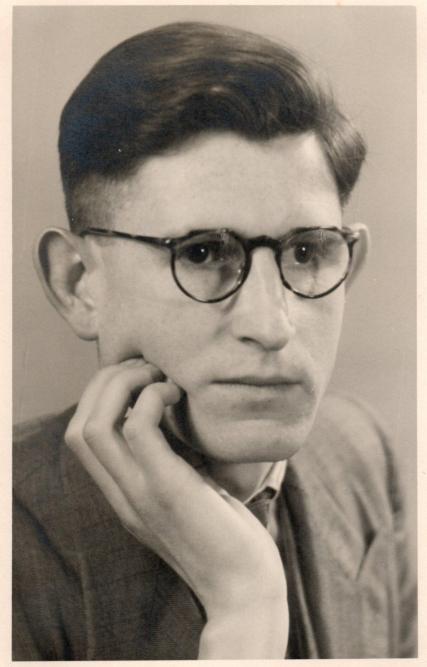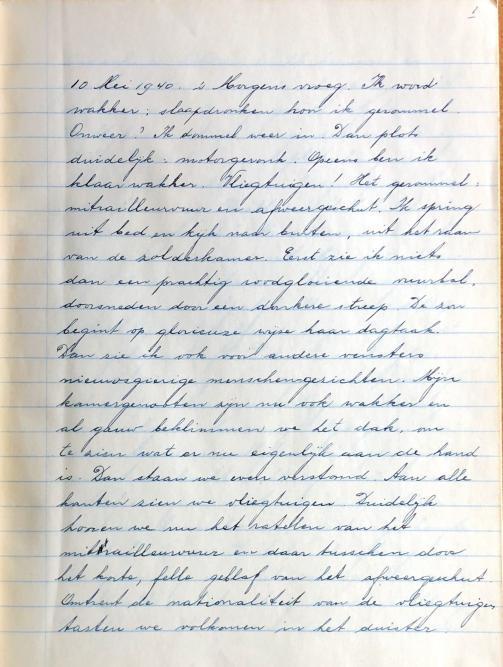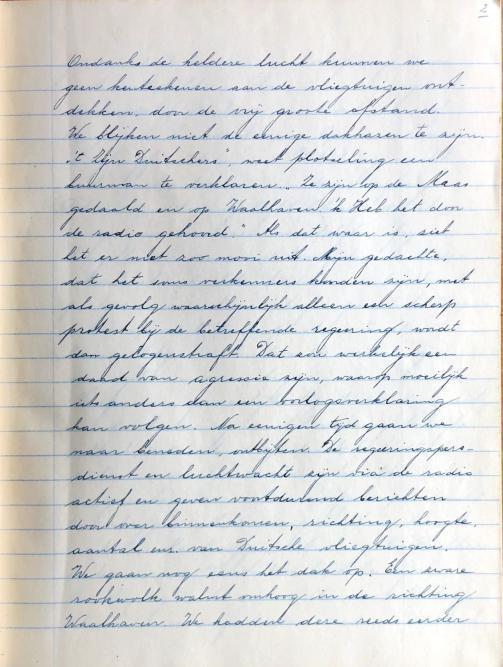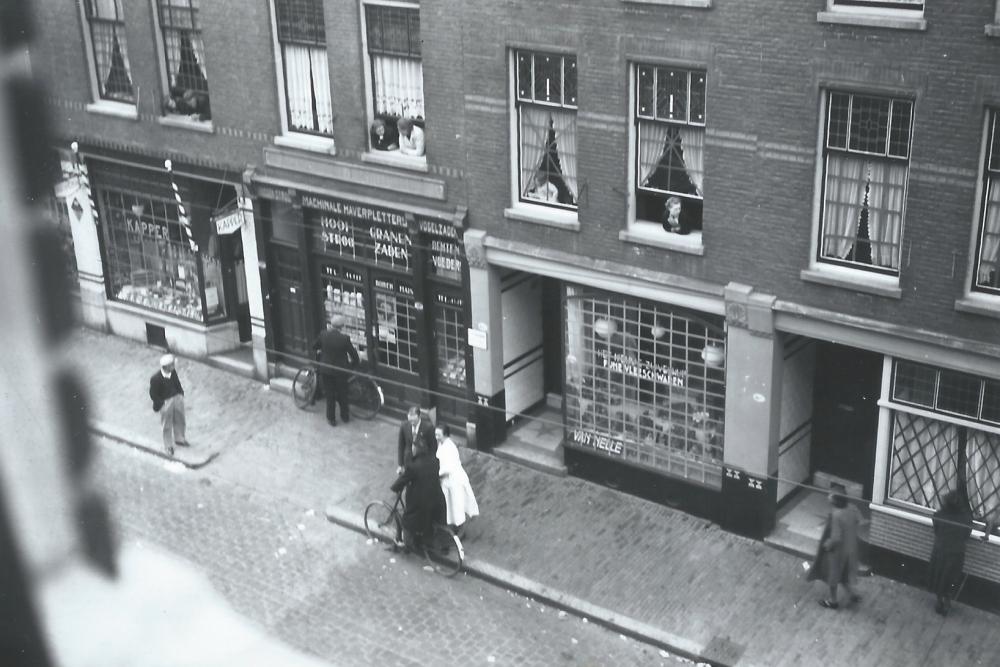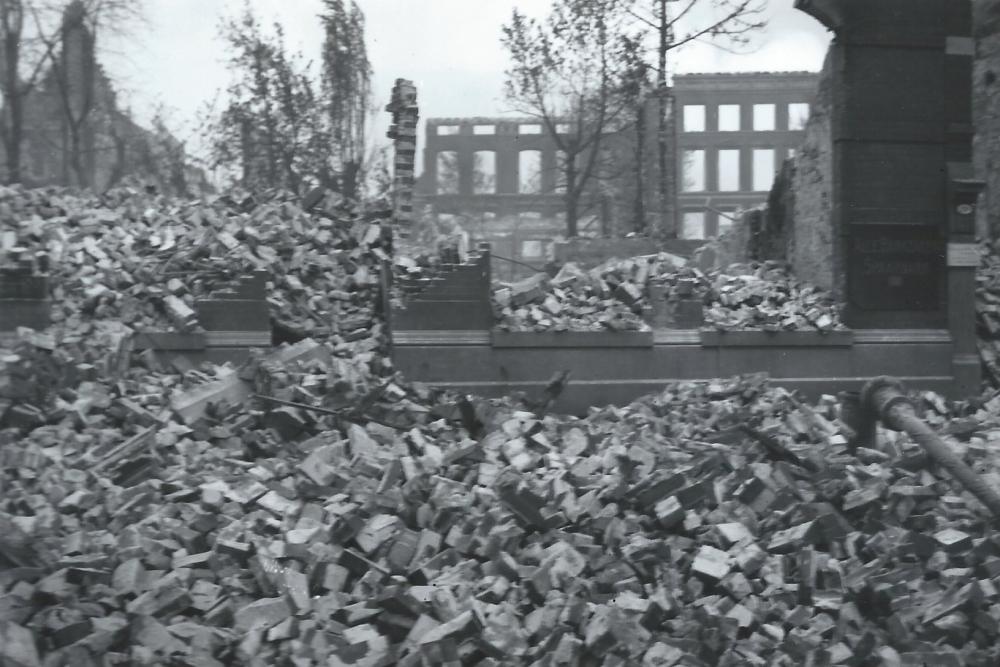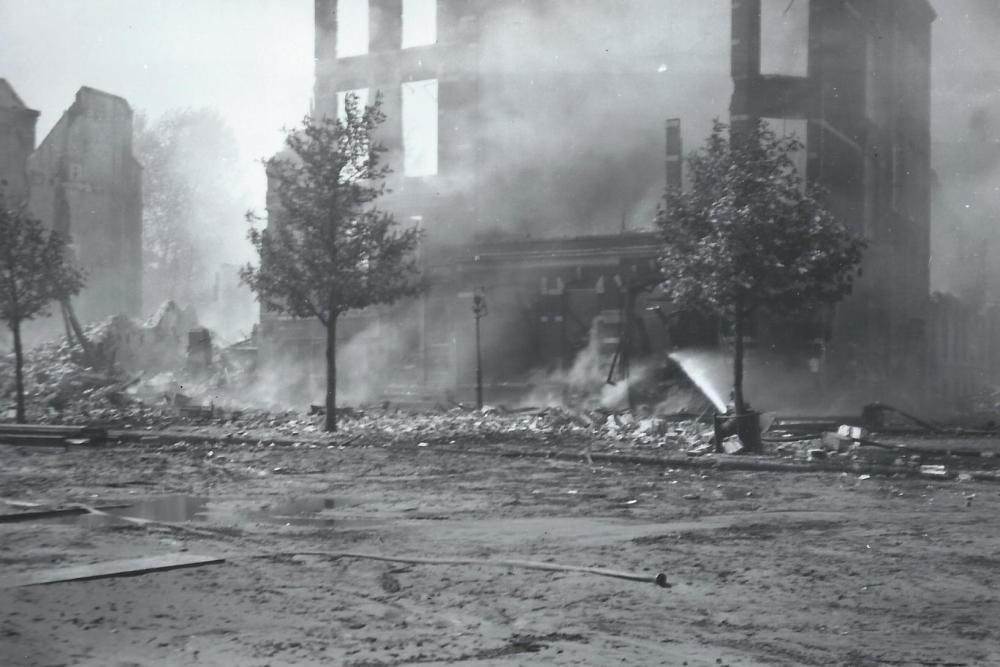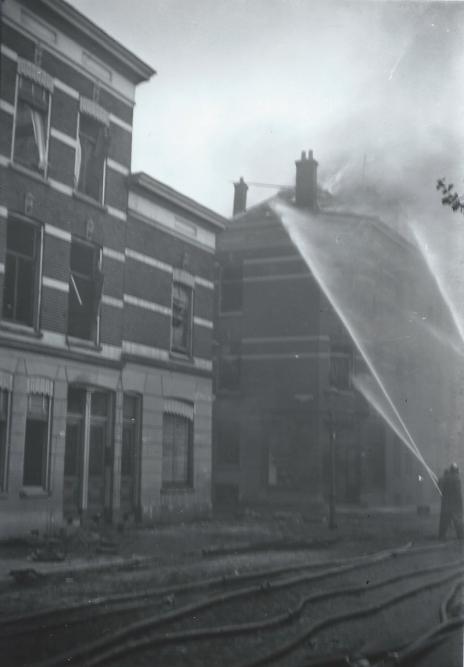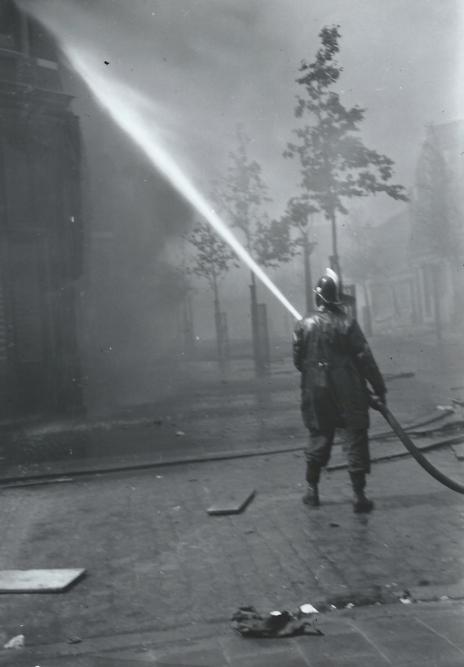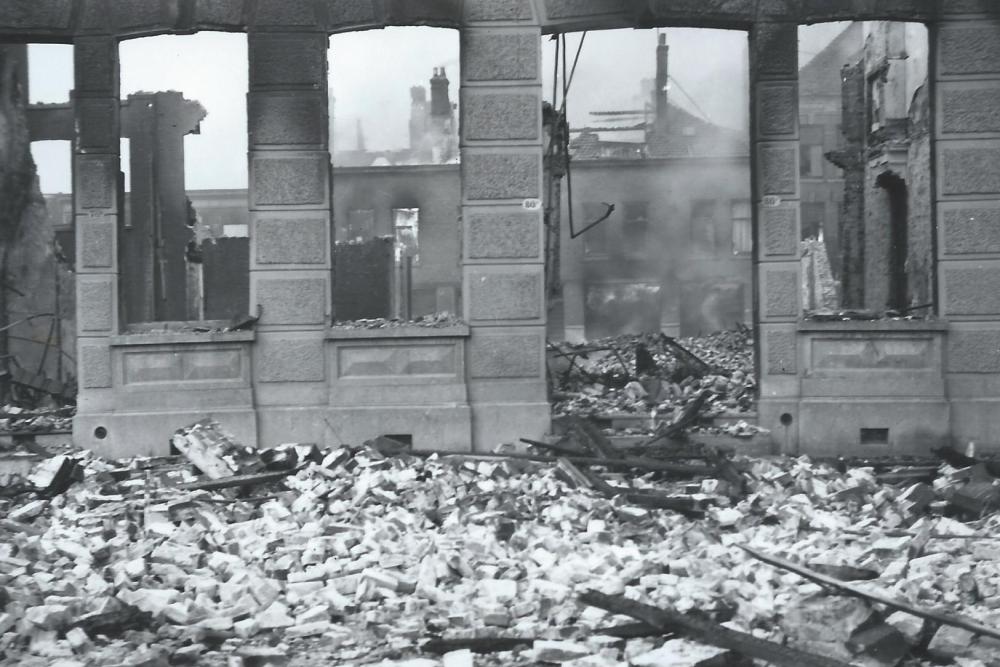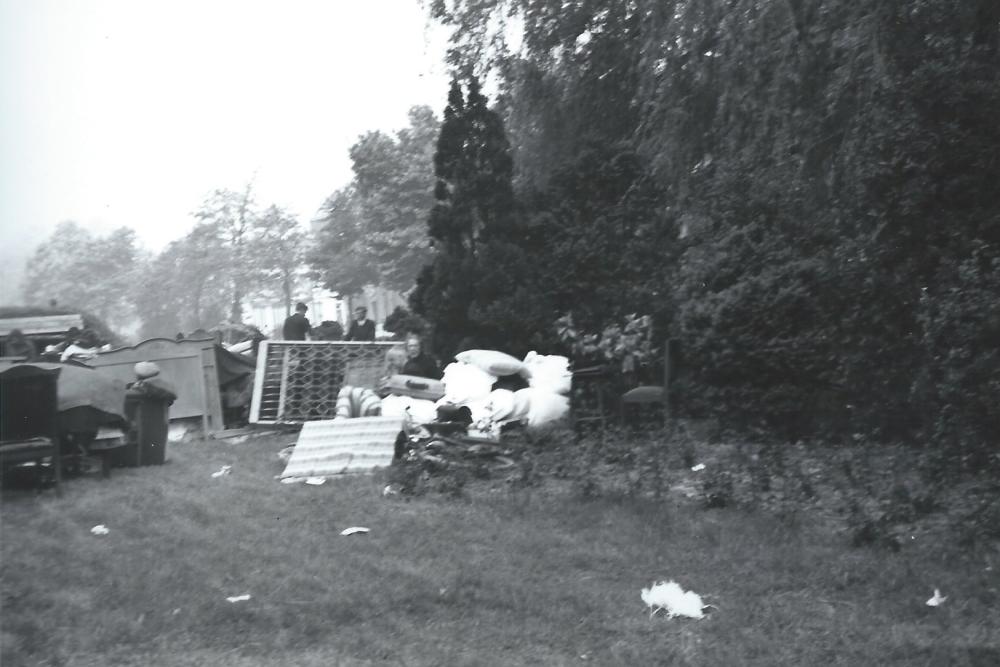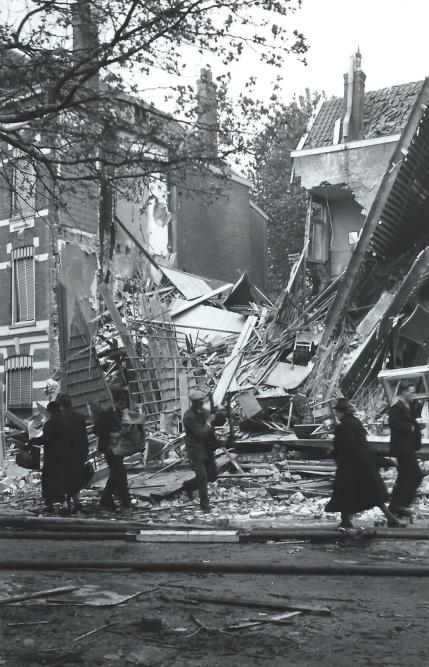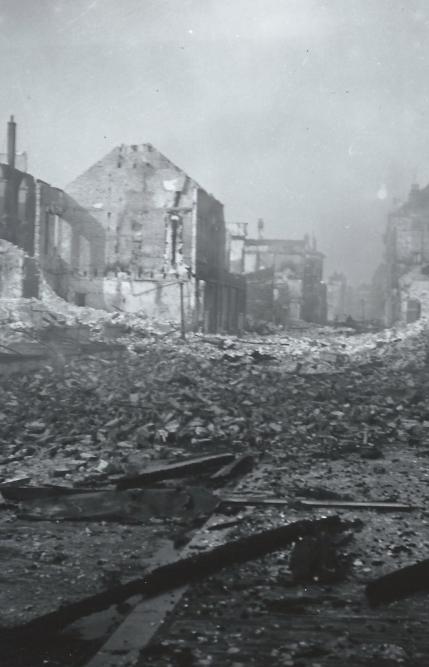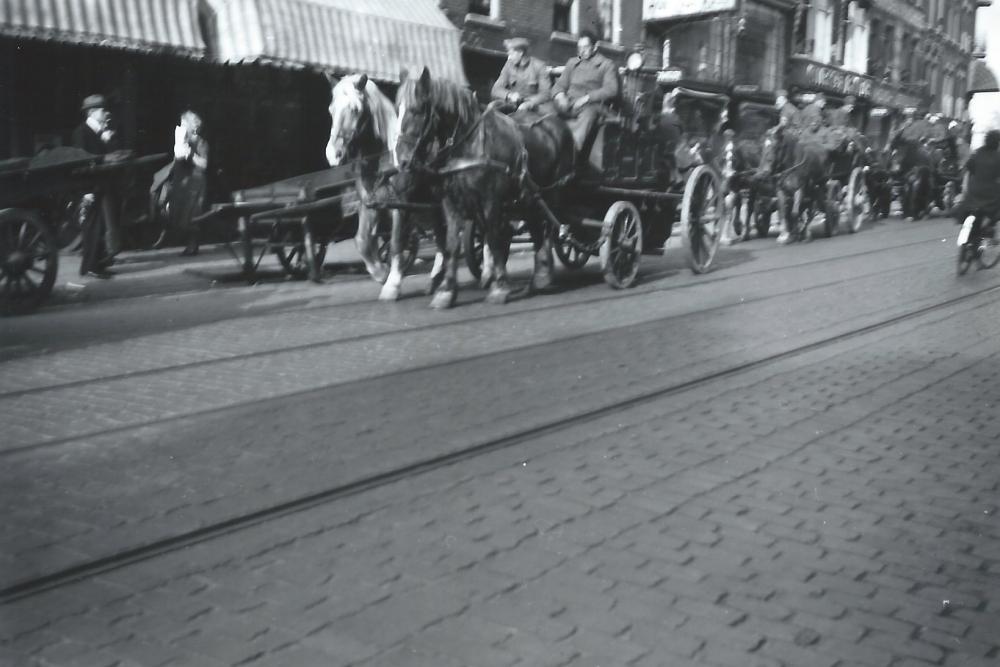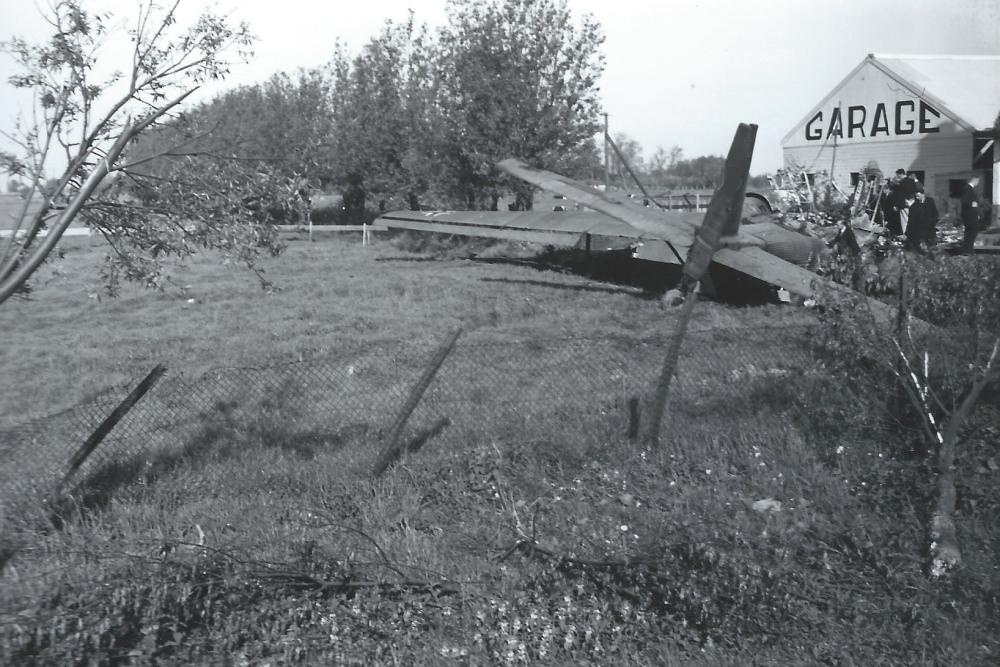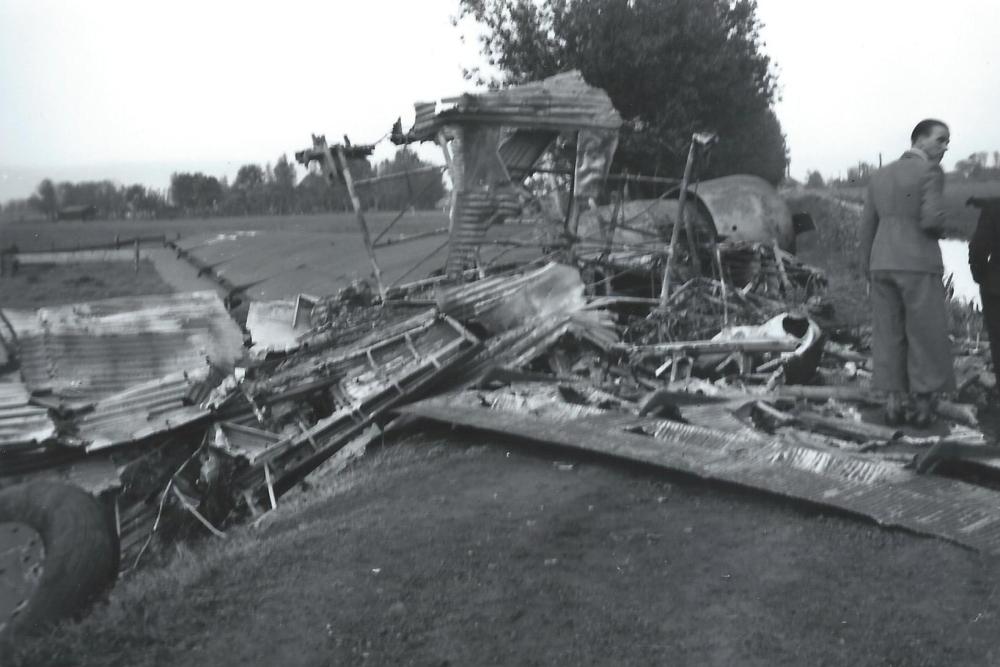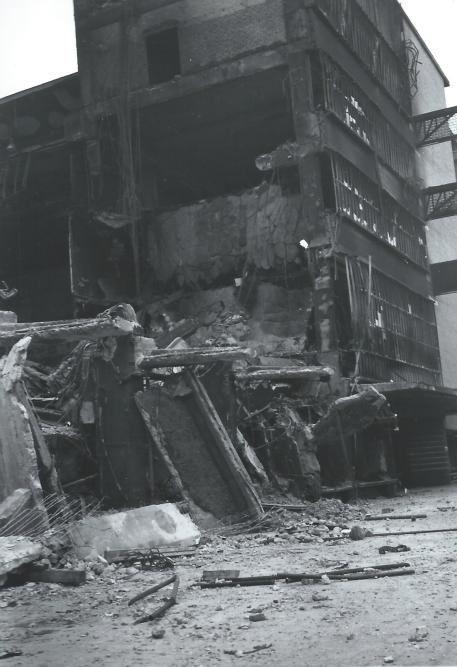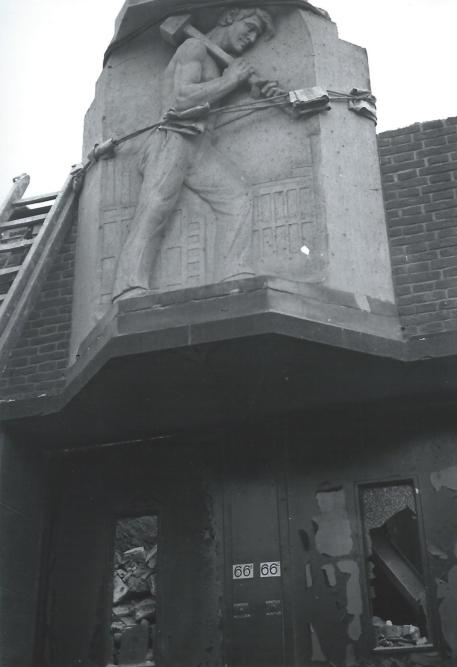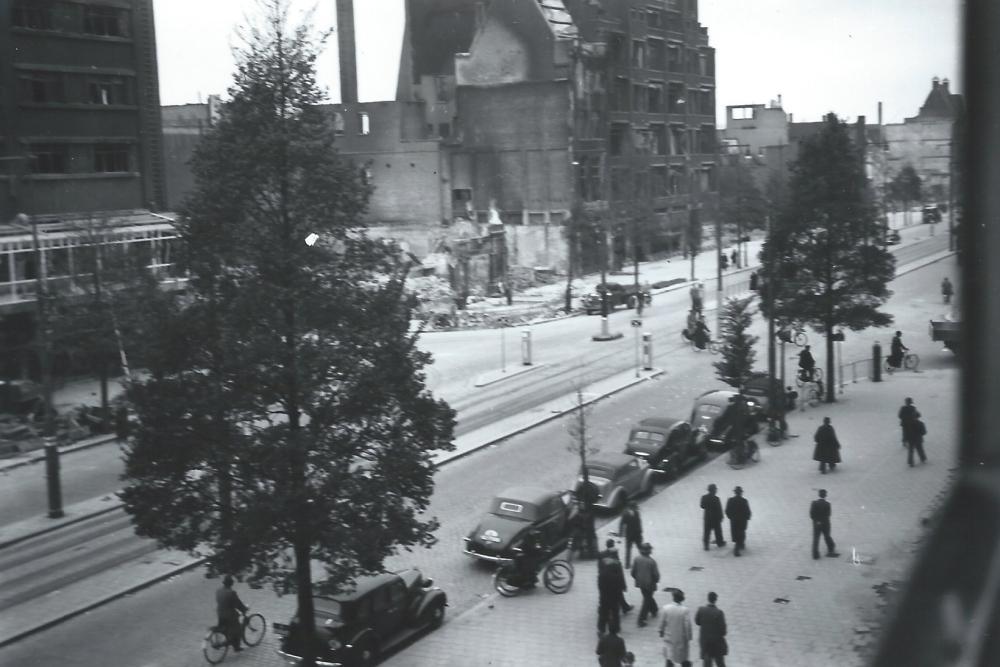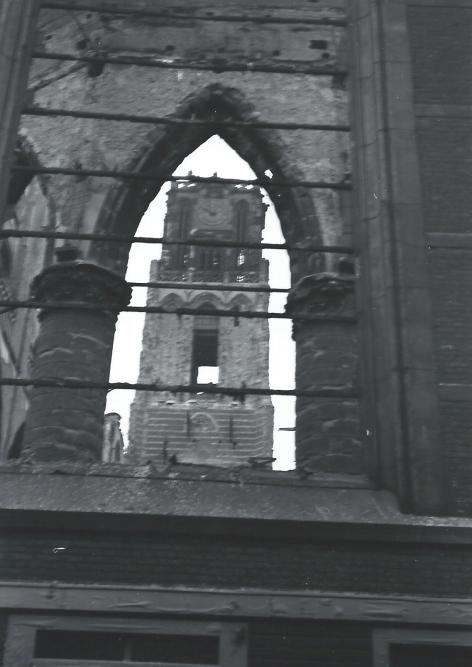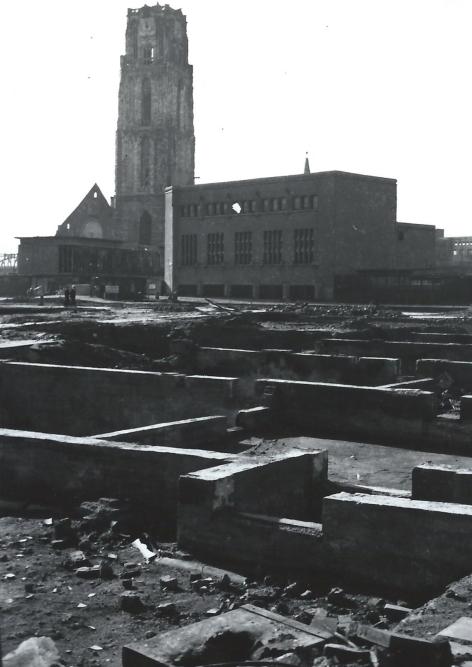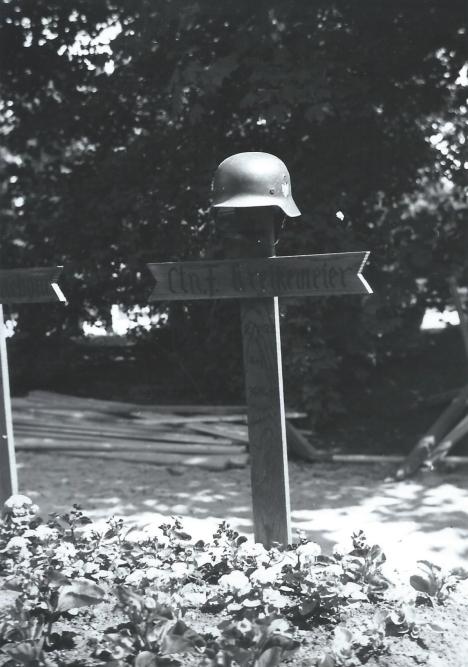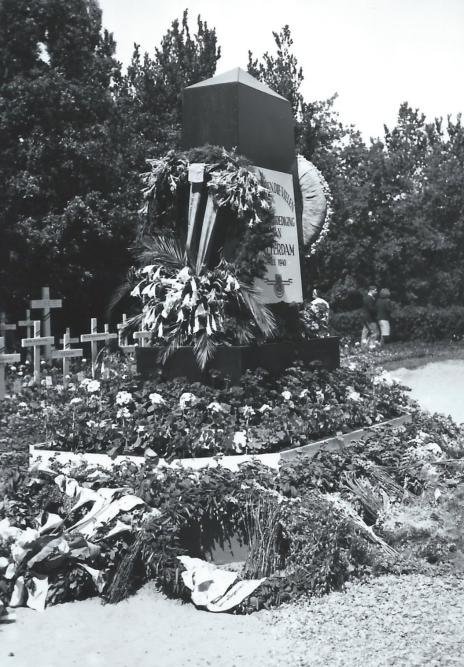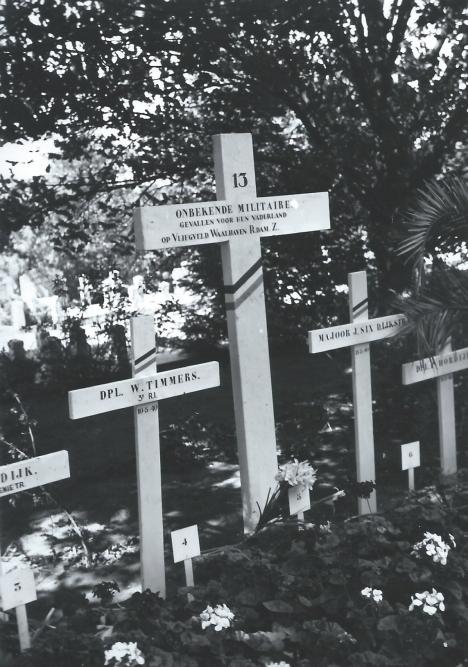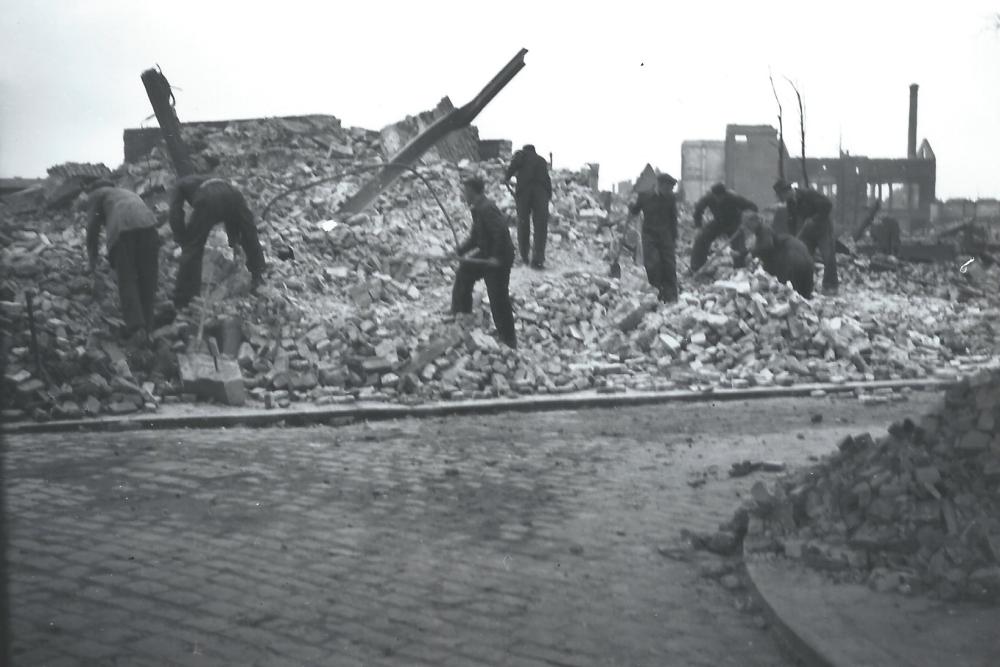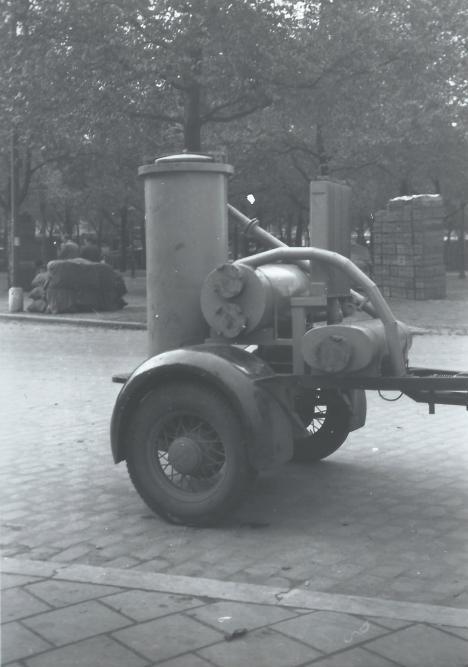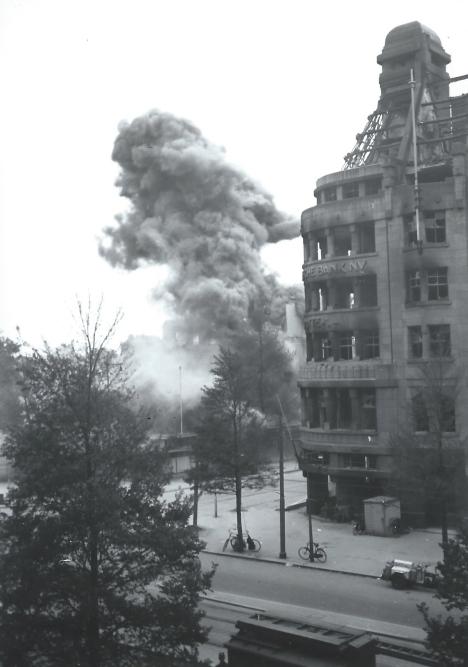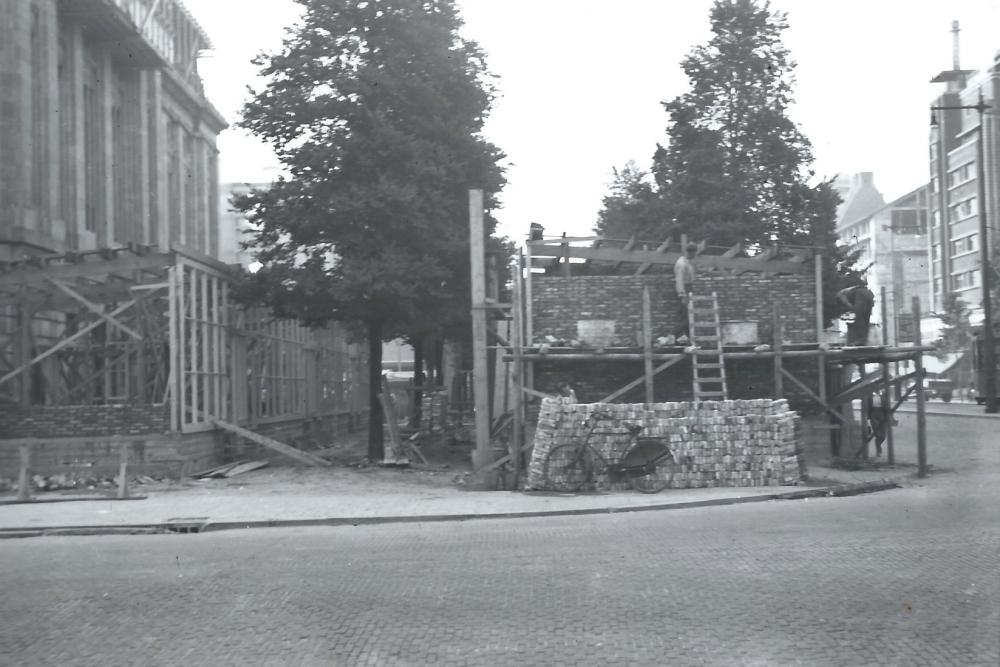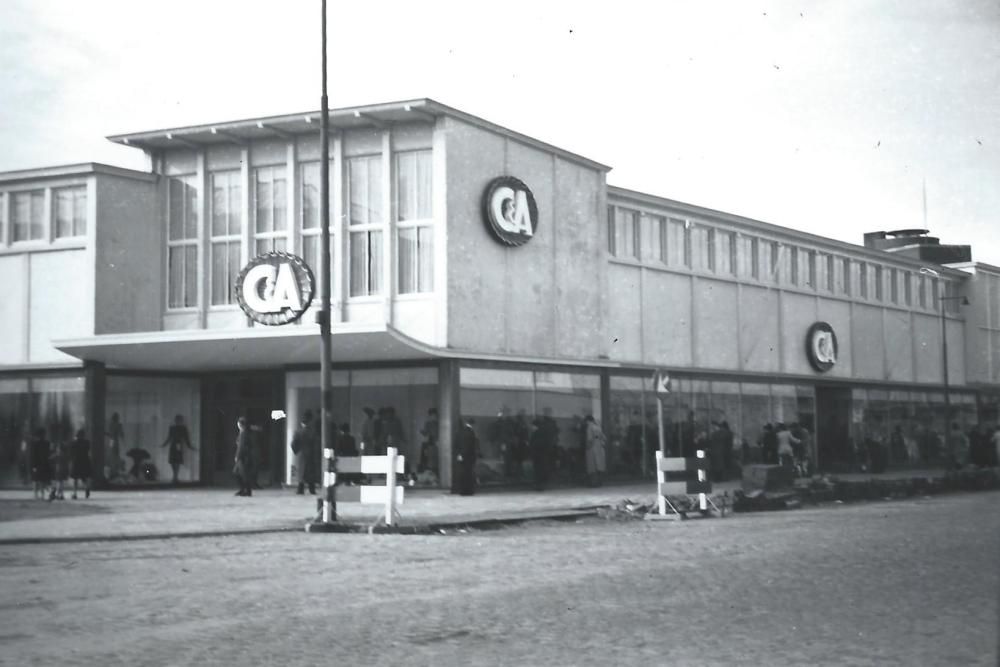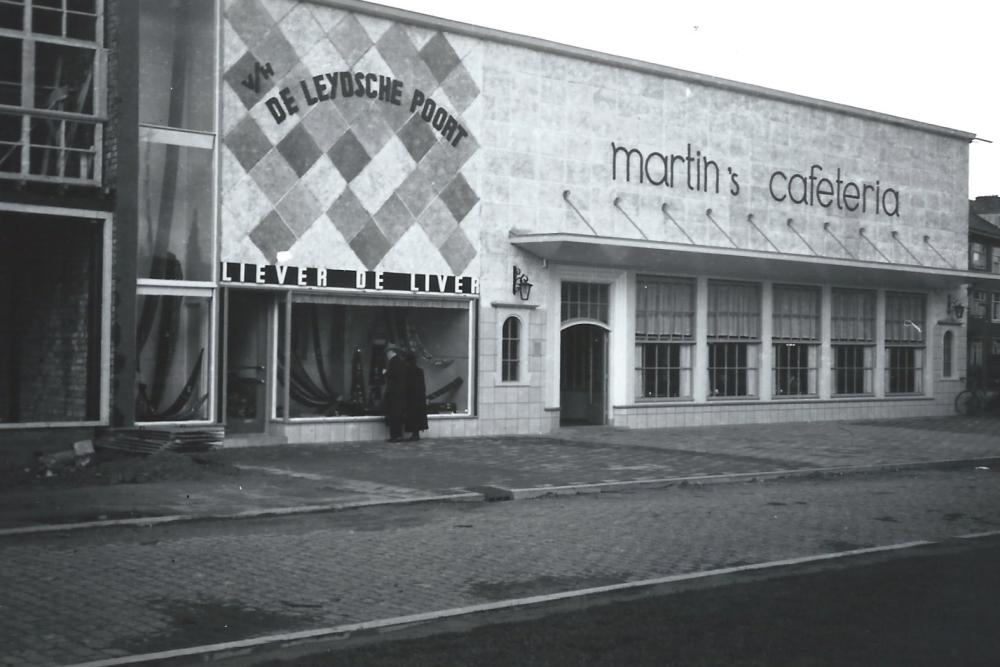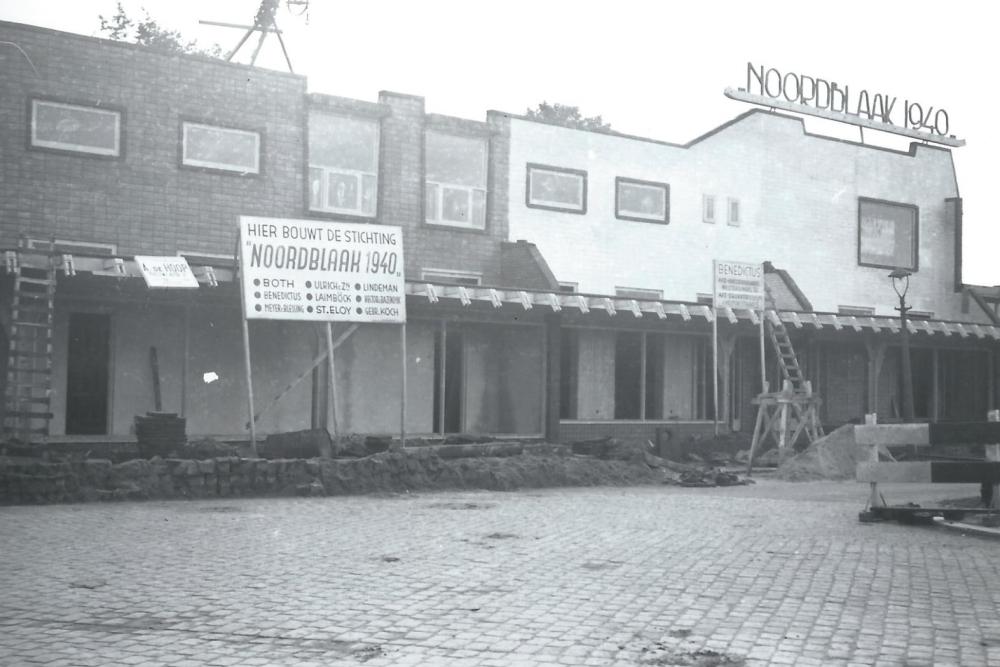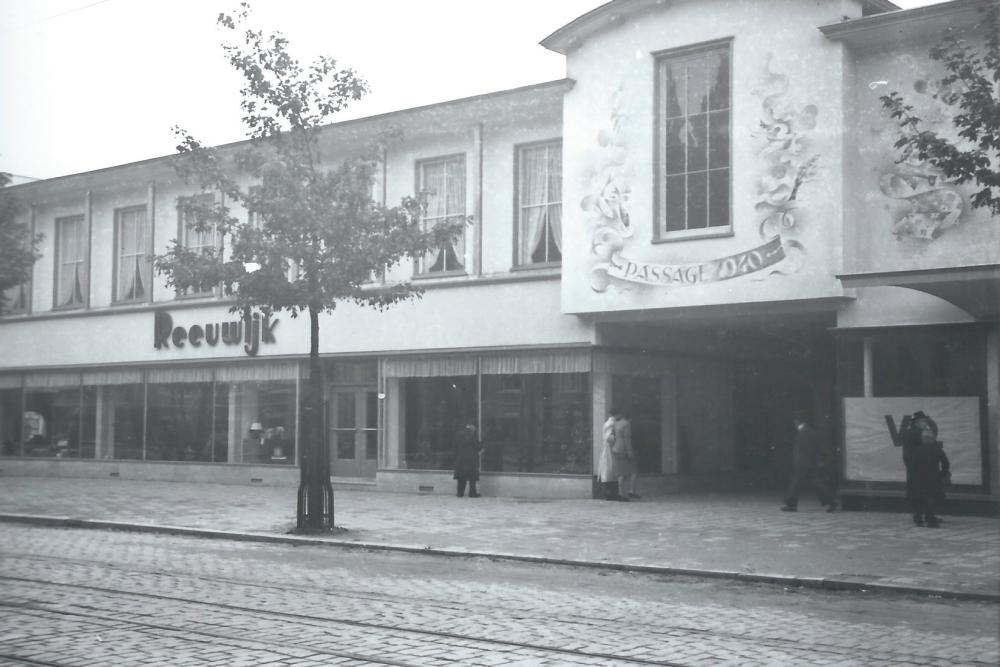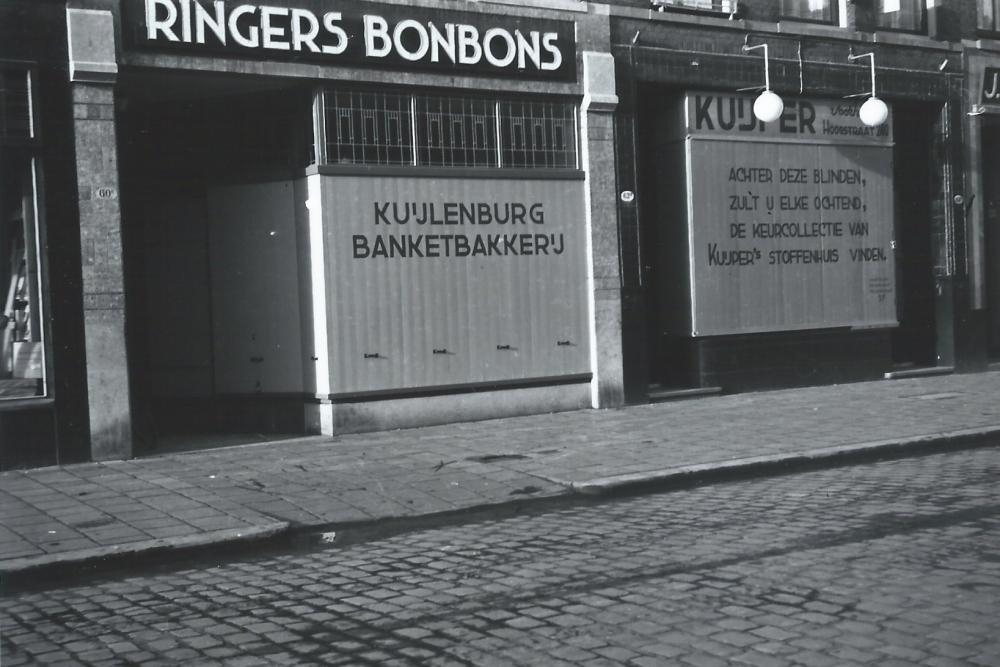Introduction
Below you’ll find the diary, kept by Reiner Brentjes (1917-1996) from Rotterdam in the period between May 10 up to August 17 1940. In a notebook he kept a daily record of what he experienced and which important events were in the news. Among other things, he writes about the German invasion of the Netherlands and the German bombardment on Rotterdam on May 14. Armed with a camera, he recorded the war damage in Rotterdam and surroundings through his own eyes. Many of his pictures are included in the diary. In words and images, Reinier Brentjes shows the impact of the violence of war on the lives of common inhabitants of Rotterdam and the flexibility with which normal life was resumed soon.
Friday, May 10, 1940
Early morning. I wake up drowsy and I hear rumbling. Thunder? I doze off again. Then suddenly: roaring of engines. At once I am wide awake. Aircraft! The rumbling: machinegun and anti-aircraft fire. I jump out of bed and look outside, through the window of the room in the attic. Initially I see nothing but a beautiful ball, glowing red with a dark line across. The sun starts its daily task in a glorious manner. Then I see curious human faces in other windows.
My roommates have now woken up as well and soon we climb onto the roof to see what is really going on. We are thunderstruck for a while. We see aircraft everywhere. We now hear the machinegun fire clearly, interrupted by the short, intense barking of the anti-aircraft fire. We are at a complete loss about the nationality of the airplanes. Despite the clear sky, we cannot identify any markings due to the relatively great distance.
We turn out not be the only roof top bunnies. 'Those are Germans', a neighbor suddenly explains. 'They have landed on the Maas and on Waalhaven airbase. I heard it on the radio.' If that were true, things are not looking so good. My idea, they could be scouts, probably resulting in a sharp protest to the government involved, would be countermanded then. That would really be an act of aggression which could hardly be followed by anything else but a declaration of war.
After a while we go down to have breakfast. The press service of the government and the air raid wardens are active on the radio and constantly pass messages about the arrival, direction, altitude and number etc. of German aircraft.
We go up the roof again. A cloud of dark smoke rises in the direction of Waalhaven airbase. We had seen this before but couldn't determine its location. Now we hear that probably the shed of Koolhoven [an aircraft factory] and hangars are on fire. Again, swarms of aircraft pass by. Suddenly a dot detaches itself from one of the planes. To our surprise it turns out to be a parachute with a human figure dangling beneath it, swaying wildly in the wind. Later on, we hear the air raid defense warning by radio against parachute troops, trying to land in various locations. According to the radio they are being surrounded and destroyed.
Earlier than usual I go outside to feel the mood of the people massing on the streets and to try and gather information about last night's events. I hear more rumors than anything else. The bridges on the river Maas and Waalhaven airbase have allegedly been occupied by the Germans. It is hard however to have this confirmed. Some people suddenly deem it necessary to start voicing criticism about the defensive measures of the government. Bad timing.
In the city center, some locations have been cordoned off, nobody gets through. A platoon of Marines arrives as reinforcement, bayonets and pistols at the ready. There is however no question of any panic.
At 08:00 I hear that The Netherlands are officially at war with Germany, as a result of the German attack. It is the first war I will go through…..
Arriving at the office, some necessary work is done, waiting for the arrival of the management. They don't show up. A telephone call is unsuccessful as in the residence of the management in The Hague, the call isn't answered. A requested call to Sliedrecht has no success either. 'Put the phone down, this number is out of order,' so the female phone operator says. When I put in another request for a call to The Hague, I am informed the call will not be permitted right now.
At about 11:00. Ring -telephone. 'Hello'.
'Do you still want to call The Hague?'
'If possible, yes please, miss'.
'Go ahead'
and finally the connection is made; it turns out there is no connection between The Hague and Rotterdam. No trains, no cars, in short those in The Hague will have to stay where they are. After an exchange of messages, the call is ended. Working is impossible today so the office is closed.
At about 12:30 I go and take a look on the roof once more because there is heavy shooting again. And there I watch it unfold: four or five aircraft are circling around, making loopings, in short true aerobatics. It is obvious: an air battle and I am bystander and listener because the machine guns rattle. Suddenly one of the planes increases speed and detaches itself from the fighting airplanes, drawing a black trail of smoke behind it: is it going to lay a smoke screen? I think so. But then a long flame erupts from the speeding plane. Then slowly the nose points downward; it is now entirely engulfed in flames and then it dives straight down at an immense speed, like a fiery ball. A little later, a black column of smoke rises in the blue sky where the plane must have crashed. When I watched this unfold, I pinched my hands for a moment. I do not know whether it was a Dutch or a German aircraft but one thing is certain: there were people inside and in the very short time this happened, they could not have saved themselves and for a moment, I felt the horror of war.
A colleague of mine wasn't entirely mistaken when, as a funeral cortege passed by, he made the cynical remark: 'That one has left just in time. He'll rest in peace'.
In the afternoon, I jumped on my bike to check on the situation. It is rather busy on the streets. Arriving on Westzeedijk, it appears Scheepstimmermanslaan has been closed off as well. Hence you can't get close to the Maas. I take the road to Schiedam. Teams of workers are busily filling sand bags. Empty trucks arrive and soon drive away with full bags.
There are military checkpoints on numerous locations, they are also deployed hiding along the side of the road. Sometimes they fire their guns at German planes, sometimes even their pistols.
I ride back to Rotterdam. As I arrive in Delfshaven, suddenly there is the sound of a siren and a few moments later, the entire alarm system opens up. A nerve shattering, hellish sound. People run to their homes or into other houses. The trenches are filling up as well. Except for those standing in doorways, the streets are empty soon. Then, slowly, six large bombers arrive at low altitude. The ack-ack fire barks. The large planes fly on, sirens are wailing…
When I ride on at the end of the air raid alarm, looking in the direction of Waalhaven, near the Ruigeplaat bridge, I see three clouds of black smoke in the sky. They rise slowly…..
On my way back to the center of the city, the alarm is sounded a few times but eventually, I get where I want to be. In this particular afternoon, the inhabitants of Rotterdam have displayed a frenzy activity of blacking out. Almost all windows, but in particular shop windows have been covered up in a more or less artistic fashion.
In the evening, we work at home by the light of a petrol lamp. We still have not blacked out sufficiently to make full use of the electric light. Outside, everything is dark. Black shadows pass the houses in silence – soldiers. We are all in bed even before 22:00. For a moment, in my mind I go over of all the events during this day, the first day of war that I experience from close by. Then I fall asleep.
Definitielijst
- raid
- Fast military raid in enemy territory
Saturday, May 11, 1940
Next morning, May 11, towards 06:30, I am woken up by the sound of sirens. An air raid again! I get up and as soon as the danger is over, I climb up the roof once more. In the distance, in the direction of Overmaas there are a number of large fires. I can't determine what they are. People say; the Oranjeboom brewery; v.d. Lugt, the packaging factory and the timbershop. I can't check it just like all other message can't be verified at the moment. Therefore, it seems wise to ignore all those wild rumors, at least unconditionally. At 08:15 I go to the office. Probably there won't be any work done today as well.
There is a small gathering on Noorderplein. A civilian walks beside the commander of a platoon of Marines and points to a house. They go there. The civilian points to a name shield, a few Marines go upstairs and five minutes later they return with an elderly man: people say: a German or an NSB member. He is escorted to a military vehicle. He waves to the house for a moment. Then he is driven away, for how long?
Although it probably was in the interest of the Dutch state, an occurrence like that makes your stomach turn, in particular when you see how the civilian provides addresses with obvious pleasure. However, there's a war on and scruples go out the window. When violence gets priority over reason, people seem to adopt a quite different attitude. How quickly people start hating their opponents; that is exactly the demoralizing effect of war. I hope that during this war I can continue to see them as people, without giving in to the aversion you can feel so easily.
After having arrived at the office and a phone connection to the management in The Hague is established I can find nothing else to do but cover the windows with paper and glue with the help of a colleague who hadn't stopped himself from coming up. The boy who was sent off to get tape, didn't come back.
After having finished this job we decide to go home but, as soon as I enter Diergaardelaan, I am pulled inside with a snarl. And no wonder. Street fighting is raging on Coolsingel and immediate surroundings. A heavy machinegun is deployed. Shots of guns and pistols ring out, interrupted by the rattling of machineguns. I can do nothing else but stay inside, waiting until we can escape from our involuntary and not exactly cozy prison.
It is now almost 12:30. My stomach starts protesting but outside, machineguns are rattling, guns barking. Now the aircraft join the fracas. It turns into a disgusting symphony with all of us the uninvited and involuntary audience. And we haven't the slightest idea how things stand, whether we will encounter German or Dutch soldiers later. We don't have a radio, phone connections are hard to get. As I write this, the sirens start again, joining the sinister concert mentioned earlier.
The last information I have is from 08:00 this morning. The official announcement said that over 100 German aircraft have been shot down, 4 armored trains are said to be destroyed of which one, near Venlo, has been blown up with bridge and all. I don't know about Dutch losses up till now. May not many die.
When I went to the office this morning, I saw clouds of smoke rise from the direction of Beursplein. As told by a neighbor from across the street whom I saw while he was standing in the door, the old Exchange building, the Twentsche Bank and the Maasstation, all seem to be on fire. I hope to see soon for myself what is true of all of this. My spokesman gives me the official news that the German attack has failed so far.
It is 13:00 now. Quickly, some people venture out on the street. We decide to leave as well. Just when we go out the door, another group of soldiers arrives, the shooting starts again. When all is quiet after fifteen minutes, we try again and with success this time. Only once we flee inside through an open door. Then, after five minutes, we continue via Slagveld (the name battlefield is very fitting today) onto Schiekade. Only once do we have to make a small detour again. Then my colleague continues towards Hillegersberg and I go home. I arrive at 14:00.
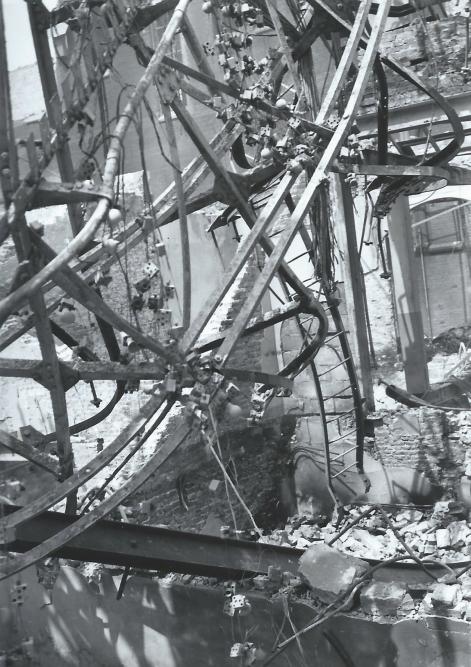
The news ticker of the Rotterdams Nieuwsblad on Slagveld has been destroyed. Picture taken May 15, 1940. Source: Reinier Brentjes
After an hour I go to Hillegersberg, this time by bike along he Rotte. On the way back, the Terbregscheweg is on my left. Next to it open country. A wooded area, peacefully showing the light green spring foliage. A second later, the artillery opens up from the same peaceful landscape. The railway bridge on Ceintuurbaan is guarded as well. Then silence for a while, broken now and then by a shot. Over the houses, a whitish-yellow smoke rises again; something is burning there.
At around 16:00 I am back home. Here I learn, for the first time officially via the ANP (Dutch Press Agency) that Waalhaven airbase is still occupied by German troops. It is being bombed by British aircraft which have come to the aid of the Netherlands. The other airbases, which had been occupied by the Germans yesterday, have been recaptured by our troops, according to the ANP. German troops however have managed to cross the Gelderse IJssel east of Arnhem.
The air guard continuously reports new squadrons of German aircraft, mainly Heinkels, over Boxtel, Delft, Wassenaar, Hooge Zwaluwe, Rotterdam and many other cities. Numerous paratroops are being dropped: near Kreekweg – in the south of Rotterdam – 200 in a short time. For the most part they are being taken prisoner or disarmed.
It seems the German are applying unfair methods, even for war. 'Among other things, they dress as civilians or wear Dutch uniforms,' in violation of the international laws of war, (the Geneva Convention Ed.), so ANP reports. In the evening I make an attempt once more to reach the office on Diergaardelaan. Without success. On the way I encounter trucks and busses, their headlights covered with blue paper. The vehicles are crammed with soldiers.
As it has turned chilly, I wear my coat. Almost without knowing it, I walk with my hands in my pocket. Until a military checkpoint at Hofplein. 'Your hands out of your pockets, sir,' they say. Everything is being checked.
When I get home, I learn from a source – probably well-informed – that Waalhaven probably fell in German hands by treason. The alarm, German aircraft approaching in the night of May 9 to 10, hadn't been passed on, enabling them to bomb the barracks our soldiers were sleeping in completely by surprise. Those who weren't killed right away, ran out but were immediately subjected to fire from German machineguns. My spokesman had learned this from a hunter who had escaped the bloodbath. A friend of mine was also billeted at Waalhaven. Will he return? What would have been last on the minds of those who were attacked so cruelly. If there really had been a question of treason, what horrible responsibility will the culprit have called upon himself.
The same spokesman tells me that the bridge across the Maas, which was in German hands initially, has been recaptured by Marines. There isn't much compassion for injured German soldiers. They are thrown into the river. On both sides, fighting is very cruel, without mercy.
I sit near the window. Below, on the street military vehicles and guns pass by, trucks with ammunition as well. Lights aren't switched on anywhere. Slowly it gets dark. Over the houses, in the direction of the city center, a growing deep red cloud rises in the evening sky……
Definitielijst
- NSB
- National Socialist Movement. Dutch political party sympathising with the Nazis.
- raid
- Fast military raid in enemy territory
Sunday, May 12, 1940
The first thing I hear on Sunday, May 12, Whitsunday at 06:30 is the roaring of engines again and anti-aircraft fire, When I have gotten up, smoke is still rising from the city center; something must still be burning there.
The ANP announces that all religious services in Rotterdam are cancelled. The streets should remain free of course, it doesn't seem to be safe yet.
Around 09:00 I go out to see if everything is all right at the office. After having identified myself three times on my way, I reach it by a detour. Everything is still OK. I request a call to The Hague again. The phone operator tells me this could well take an hour and so I cancel the call as I don't feel like being locked in again, like yesterday.
I quickly walk down Diergaardelaan but alas, too late. I get stopped at Hofplein. Seek cover! A little later, I and a group of people, escorted by a soldier, are taken to the shelter on Stationsplein. We have to stay inside; somewhat later another group arrives.
Then, suddenly, all hell breaks loose The short, fierce shots of pistols and guns mix with the thunder of heavy guns in the distance. It seems that there is shooting at and from houses in which NSB members have entrenched themselves. We, in our hiding place, hope to be able to leave soon because it is rather crowded.
Then two others are entering, a lady and a gentleman. A minute later, a Marine arrives at the entrance. 'The man and the woman who have just come in! Will you please follow me? They go out. Someone says she was a German.
Suddenly, the firing outside stops. The soldiers are running into our trench now. Civilians, move over! Everybody inside! Hurry up! Some soldiers are extremely nervous. The people move close together. Then it looks like hell has erupted. A whistling sound grows louder. Then Stationsweg is being plastered with machinegun bullets from the aircraft. A call rings out: 'Three Germans, Messerschmitt's' (probably STUKA dive bombers. Ed.) Thundering and roaring, they head straight for our shelter in a dive, whistles blowing. Then thumping as if the world is coming to an end. The bombs drop from the aircraft. The Delftse Poort railway station is being bombed. At each explosion, a pressure wave sweeps through our shelter. The contraption is vibrating like a leaf, the debris rains down on our hats and coats.
Frightened, people cling even closer together. The soldiers fire tenaciously at the aircraft, without success. Then the air raid warning sounds. People behave themselves very well. A lady faints and is given a drink of milk. Everyone talks at once. 'Sssst, be quiet' is called out. To no avail. Then swearing : 'Shut up' It helps. The roaring disappears. It becomes quiet.
The bombing lasted five minutes at the most; I have spent hours that I will forget sooner. After fifteen minutes, the order is given: 'Civilians, leave slowly.' People are pressing towards the exit. Someone calls out: 'we were ordered to leave slowly.' Surprisingly, it helps; the pushing stops. Once outside the shelter, people run up Delftsche straat in order to get out of the danger zone as soon as possible. The street is covered with broken glass. Numerous window panes are shattered. They were surely hit. Some panes have been smashed completely.
Stationsweg and adjacent streets have been evacuated entirely; the inhabitants had to seek shelter somewhere else. Fifty meters into Delftsche straat, we have to take cover again, this time for only two minutes though. Then I arrive at Teilingerstraat safely, the road home is relatively quiet. Close to home, on Zaagmolendrift, someone says: 'Go inside, air raid,' I gladly obey this request or rather order.
It has been quite a morning. I stay home for the rest of the day. Down in the street, I see a man being arrested. He walks with his hands behind his head, a soldier behind him pointing his gun at him. Furthermore, some six funeral hearses pass by. I thought funerals would never be held on Whitsuntide. Are those victims?
In the afternoon, some eight aircraft are circling around continuously. Is it an air battle again? I hear machineguns. But they are all aircraft of the same type. It soon becomes obvious they are making a reconnaissance flight over a certain target but suddenly, although still far away, I recognize the horrifying sound of this morning and then the planes turn into a steep dive, one after the other. I hear the sound of the falling bombs. I do not know what the target is. Then the aircraft disappear. They have finished their task.
All the time now, messages about aircraft come in again from all possible cities. For the first time, Dornier aircraft are mentioned. Up to now they were the Heinkels, the agile fighters, the Messerschmitt bombers and the heavy Junkers aircraft, those are probably transport planes.
The number of reports about paratroops decreases, the Germans are probably aware that this costs too many lives. A Dutch soldier told me, he had a paratrooper descent within a few yards from the ground and then shot him. That will have happened to most of them. Our boys have no choice; if they do not destroy the Germans, they will destroy them.
When I go to bed, there is a ferocious fire in the center of the city
Definitielijst
- NSB
- National Socialist Movement. Dutch political party sympathising with the Nazis.
- raid
- Fast military raid in enemy territory
Monday, May 13, 1940
On May 13, second Whitsunday, I am woken up by the alarming sound of sirens, at 4:30 in the morning. There is also heavy shooting. It is an enormous racket. Strange, how soon you get used to it. I turn on my other side and when the sirens stop I fall asleep again and wake up around 07:30, this time in a natural way.
I get up, the water has been cut off again, that happens a few times a day. The gas is cut off as well, that can become nasty. It is no longer allowed to sell petrol and coal. The ANP warns against eating snacks and smoking cigarettes of dubious origin. In fact, our soldiers are strictly forbidden to do so. Probably poisoned snacks are being distributed, those are hellish methods. Much use is made of fake messages, distributed by radio, to cause confusion. They apply any method a reasonable man will hardly think of. Up to know, most tricks are quickly and properly exposed by the radio and in particular the ANP rendering invaluable services.
On the streets, vehicles of the Municipal Sanitary Service pass by, completely closed. They are not stopped. People mumble they are loaded with Germans and NSB members who will be dumped in a mass grave, as it is impossible to bury them separately: so many have fallen already. Many people ask each other nervously where bread can be bought. Most of the shops are sold out. Yet, once in a while people return carrying bread. It must be on sale then. The fire hydrants in the streets are all marked with white chalk in order to find them quickly at night when fire erupts. People have thought of everything.
As I go to the office at 09:00, I can't get beyond Hofplein. Each passerby has to show his ration card, at each check point. Back home, I hear the air raid service pass new messages. This time there are a lot of bombers. On behalf of the military authorities, the mayor of Rotterdam imposes a ban on the sale and distribution of alcoholic beverages for the duration of the war. Furthermore, for us inhabitants of Rotterdam, we are forbidden to be out of our houses between 20:00 and 07:00.
There seem to be quite a lot of aircraft over the city again and there is heavy firing going on. As there are heavy clouds, I can't see anything. A little past 11:00: air raid, sirens. People run inside. A funeral hearse just passing by, stops. The undertakers get out. The follow-up car also stops, the family members get out. The air raid warning applies to everyone, even a funeral cortege.
Towards 12:00 the all clear sounds. I stay at home during the afternoon. It is quiet in the northern part of the city. Frequently, Red Cross vehicles pass by. The radio calls for carpenters and workers for the right bank of the Maas in Rotterdam, in order to support the First Aid technical service. I assume barracks or something like that are to be built.
According to an official message of the supreme command the Germans have reached the coast of the Ijsselmeer, in Gelderland they have advanced up to the border of Utrecht, hence at our Waterlinie. Our border forces have retreated to their positions behind the line. In Brabant, the Germans have reached the Langstraat. The southern part of Rotterdam is still in German hands and although small in numbers, they are heavily armed,. They have no artillery though.
Towards evening, the house shudders from three heavy explosions, close by. A little later, groups of people pass by: bed linens on their backs. They come from the direction where the explosions were heard. Ever more people pass. Woman with crying children in their arms, one or two little ones pulling their skirts; a pram loaded with household goods; a man with the well-known white cane of the blind; Young and old, men and women, all pass by. Where to? Maybe most of them don't know themselves but they do know they have to get away from the sheer violence. Some of them are visibly nervous. After all, it is 20:00 and in fact, no one is allowed to be outside anymore. When a few months ago, we saw pictures from Finland showing similar events, we said: 'poor sods'. Today, we don't need those pictures anymore.
Definitielijst
- NSB
- National Socialist Movement. Dutch political party sympathising with the Nazis.
- raid
- Fast military raid in enemy territory
Tuesday, May 14, 1940
Next day, May 14, Tuesday, I go to the office at the usual time. Schiekade is as far as I am allowed to go. Before I can find out, I am forced to remain in the building of the Metal Workers Union on Hofdijk. Many of these jobless workers haven't received their wages on Saturday, some others only a fraction, a few guilders. So I am delayed at Schiekade and I continue via Provenierssingel.
Then I come to Stationssingel, it smells like soot and smoke. Many windows have been smashed. Via the underpass I reach Diergaardesingel and there it becomes clear what impact the bombs have had. From house to house, all window panes have been smashed, curtains hang in shreds before the windows, in many houses there is chaos inside. Entire leaded-glass skylights are lying on the street, just like parts of blinds. The street looks as if paved with glass, the road has been cleared a little; along the curbside, the heaps of glass are 2 inches high. On many places there are holes in the ground. Without asking, the Germans have assisted in destroying the old Diergaarde (Zoo), which was in the process of being demolished anyway. Only a bit too drastic.
On arrival at Kruiskade, on the corner of Mauritsweg, I see real rampage. A projectile has apparently struck here. The entire building on the corner is askew and destroyed; the ceilings have disappeared from top to bottom, only a few beams and reed indicate where they once were. The traffic island there has been destroyed.
What is left of the wall surrounding the old Diergaarde clearly show the traces of shrapnel of bombs and glass. In this area, most of the windows have been smashed as well, just like on Kruisstraat where I arrive next. Just rounding the corner, on Diergaardelaan and I am at the office. I see right away the windows over the office are broken as well. Then I enter to do some searching.
Fortunately, almost everything is OK, only the blinds are slightly askew, a curtain has come down with rail and all and one pane of frosted glass of a lantern has broken. Probably a shard has gone through it. I don't look for it as I don't want to stay here. After all, there is no one present. I carefully lock everything and take the same walk back.
Next to the office, seven people who have likewise lost everything, have been billeted with the neighbor. They don't live upstairs though but have put up emergency beds in the dark cellar where it is quite moist. I have been inside. The electric light is on. Nervously, the tenant tells me what she has gone through in the last few days. She shows me a piece of iron of about an inch that went through a window. I can't determine what it is; it is of cast iron.
Then I go home. On Spoorsingel we have to enter a shelter because of an air raid. In the distance, we hear the bombs falling. I am home a little before 11:00. In the afternoon, it starts. About nine bombers. The ack-ack is silent. The aircraft roar. Then the house shudders. Panes are rattling, walls are shaking. We withdraw into the ante room. The roaring disappears, then it comes back, again and again.
Smoke and flames rise from the inner city, left, right, everywhere. And the aircraft return again. Mercilessly, everything is razed to the ground. The radio is silent, electricity is cut off, probably the power plant has been hit. Water pipes – no water. The pressure of the gas is almost nil. And the bombing continues. I don't know for how long.
My father works in the inner city. Hundreds of flights, it is unbearable. Then waving from across the street, there are people at the door. The electric bell does not work. We open. Then we have to help a few people upstairs, two of them are hardly conscious. It is almost the entire family of my father's boss, my father himself and a colleague. Suddenly, it is mayhem: water and towels are brought in. The people are in shock. From bits of the conversation, it can be construed what has happened in the center, in particular in the Oppert.
When the people had just finished lunch, the bombardment was unleashed. The bombs struck very close, the whole building shuddered. All went to the shelter, constructed from rolls of paper and beams. The people braced the walls. The ceiling bends, the floor bends. Then a hit. The building is on fire. Led by the boss, who remains calm like his workers, an attempt is made to douse the fire with sand, dirt and water. Meanwhile, the bombing continues. For one of the men, it is too much. He loses his mind and jumps outside through the broken shop window. 'I flee!' he calls out. His colleagues call him back. He does not listen. Later on, we will hear whether he has escaped with his life.
The fire in the shop rages on. There is no chance of dousing it. The ceilings are caving in. The bombing has stopped now. The situation is untenable. They will have to flee while it is still possible. Then they are outside. Everything surrounding them is on fire. A house across the street has been blown away completely. Now that he is outside, watching as his entire shop, his life's work, is destroyed within an hour, it becomes too much for the boss, he is like broken.
In our house, they recover somewhat. After about an hour, they leave and go to friends or family. The boss has regained his optimism when he says: 'We will try and open another shop boys'. A vital man. For a moment my mother and I, I have to admit, come close to tears when the boss says to my mother: 'You have a little boy, mother but you can be proud of him. He behaved himself like a hero'.
Then they leave. A little later, four other people, who do not know whether they will find their house, pay us a visit. When they have gone too, my sister comes home a little later and at that moment our family is entirely complete. For moment we were afraid of it.
I probably forgot to tell much; it is the most emotional afternoon of these five days of war. We got to know it in its most horrible form, the aerial bombardment and our troops unable to do anything about it.
Suddenly, at 16:11 on my watch, outside somebody yells: 'Armistice.' Could it be true? Nobody knows, no official announcements, nothing works anymore. On the other hand, it is said that our troops have surrendered. I hope one of these is true, it has cost too many victims already During the bombardment of this afternoon, many have surely perished.
Rotterdam has been plastered. The city center has been razed to the ground or is on fire. Soldiers wander about, unarmed; they have turned them in. They know nothing officially either. It is said that during the bombardment, men were shooting each other, hence our boys didn't know what to do anymore. Some are furious, they had wanted to fight on, they didn't want to give up yet.
I go into town, to the office. Hofdijk is in flames, Teilingerstraat, Zomerhofstraat, Stationsweg, Hofplein, everything is on fire. Anywhere I look, flames rise into the sky. I reach the office in a roundabout way. To my surprise, nothing is on fire yet. A little farther and across the street some houses are aflame.
I go inside. At the back, separated by small garden, there is a fire. Stationsweg. It crackles and it is hot. When the wind is unfavorable for a while, everything here will catch fire as well and nothing can be done against it.
I move the most flammable stuff away from the doors; it won't help much. A valuable painting, which isn't in the safe, goes to the cellar; I hope it will remain unscathed. Then I shove some more or less important documents into a bag and leave, after having smashed the letterbox to take the mail with me.
For the moment, I don't know what more to do. I go home through the white hot Teilingerstraat, there's a fire on both sides. A house caves in with a thundering sound. More will follow. The sky gets a blackish-red color. Thick clouds of smoke float over the city. Rotterdam is on fire.
At home, I learn that the drinking water allegedly has been poisoned. Is it true? I'd rather not find out. At 17:30, I go back to the office with my father to try and recover anything if possible before it catches fire. We cannot get through though, it can't be done. The citizens of Rotterdam seems to have degenerated into a robber's mob. Everywhere, you see people walking with rugs, coats, shoes, wool; yes anything, the shops are robbed clean. It is a real looting party and a disgusting sight. We abstain from this immoral action. If people empty a burning house, OK otherwise everything will catch fire anyway. Looting normal shops cannot be justified however. At 19:30 there are some who have to take their booty to a police station. Finally, someone intervenes.
I climb up on the roof. From east through south to west, the city is on fire. It is half a ring of fire, a frightening view but mighty and impressive as well.
I go back into town. It is evening now. I see two people with a brand new radio, stolen.
Hundreds of Dutch soldiers are sitting in front of the Heineken brewery, their guns stacked in the inner yard. The boys are waiting, their faces are gloomy.
I go on now. The fires are terrible. It really is a sea of fire. The flames spread with immense speed, with a wailing sound. The entire inner city seems to be on fire of a ferocity which makes extinguishing almost impossible. Moreover, there is no pressure on the water mains; only when there is open water like in the canals, the Schie, attempts at extinguishing are made with the ancient pumps which are operated by hand.
They will have to let the blocks of houses burn out by themselves. The evening has a ghostly color. The flames rise high above the houses; sparks fly through the air. It looks phantastic. Will there ever be a city so heavily bombed and burned out like Rotterdam?
Cars are converging on St. Franciscus hospital. Wounded. I find a dead dove in the street. A victim as well.
A block leader tells me, he knows that Rotterdam has officially surrendered. At home we have some people to sleep, they were too close to the fire and have fled. We go to bed later, we don't need light, the sky provides enough light.
Definitielijst
- raid
- Fast military raid in enemy territory
Wednesday May 15, 1940.
When we wake up – some people have stayed awake – the sky isn't red, there are thick clouds of smoke over the city. It seems like the worst is over. At 07:00 we go outside.
Yesterday's sea of fire was impressive but what we see now is beyond imagination. Mountains of debris lie on the street, soot and ashes lie and fly around everywhere.
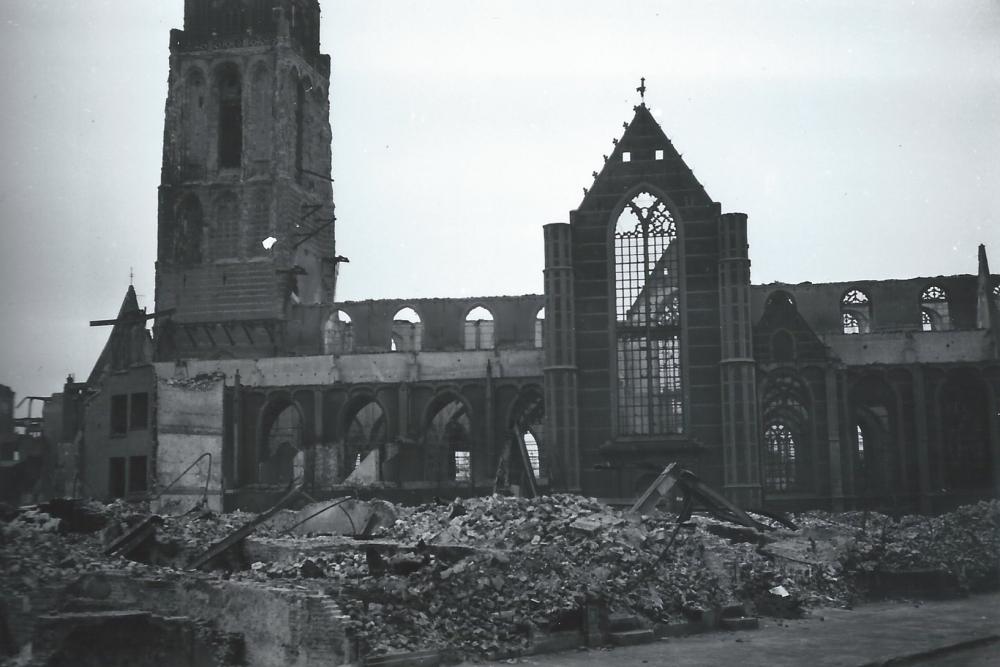
The Grootte or Sint Laurenskerk after the bombardment. Picture taken on June 1 1940. Source: Reinier Brentjes
Entire suburbs are razed to the ground, at some places, parts of walls are still standing. Other facades are engulfed in flames. Numerous buildings are aflame from top to bottom. It is tragic to see how buildings cave in one after the other. I walk around with my brother, he works at the Nieuwsblad. We go there through piles of debris. A few walls are still standing, some bent rods and rolls mark the place where mighty rotary presses once stood. Then we look for Diergaardelaan where I once worked. Yes, we are looking for it. There is nothing more to see than a pile of debris. A mountain of stones lie where my office used to be, it is still smoldering. Yesterday I was still inside. Last evening. We turn back. There, where Diergaardelaan began once, stands a big St. Bernard dog, its massive head immobile, staring at the debris. Was this its home once?
Mr. Oud, the mayor advises the citizens in a proclamation to remain calm as the city has surrendered.
When we return home at 08:00, our eyes are full of soot and smoke, we smell like we have been smoldering ourselves.
I never would have thought a bombardment could have such a catastrophic impact. It is the merciless modern war, the war of the 20th century, in which courage plays no role anymore. Now only violence reigns. Nothing is left of the shop, which had caught fire, where my father worked yesterday.
It is busy on the streets. Nearly all cargo vans have been converted to Red Cross vehicles. It may be called a miracle that our family and our possessions have come through so well. Thousands of others are homeless now and own nothing any more. Desperately, some try to save whatever can be saved. The red rooster crows victory in Rotterdam.
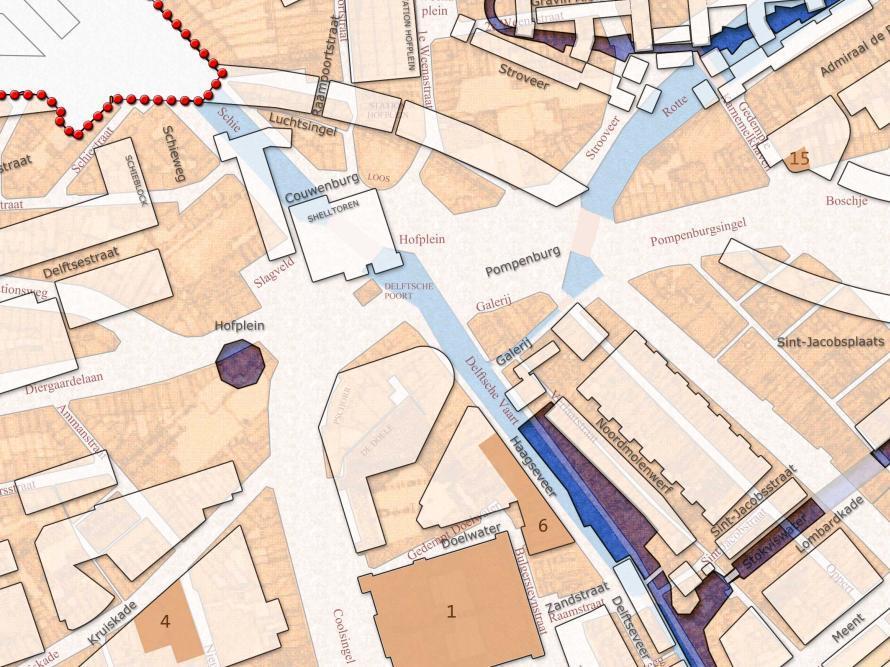
Map of Hofplein and surroundings, 1939 compared with today.vergeleken met nu. Detail of 'Dubbelplattegrond Rotterdam 1939/NU'. Source: Frans Blok
Let me take a look, it is Wednesday May 15 now. Sometimes, you don't even know what day of the week it is. I go out on the street again. There is furniture on the side of the road. Pitiful old people sit next to it. Some are crying. From time to time, some German soldiers pass by.
I go back to the office. A chunk of wall is still standing There is a sign on it: 'All banking business'. It is a ruin, a pile of junk. As I am watching, a house caves in behind me, I think it is wise to go back, it is too dangerous here. Moreover, I am gasping from the smoke.
Where ever, possible, fires are being extinguished. The fire peters out, everything has burnt away. In a side street of Teilingerstraat, a bomb has smashed into a house. An mutilated body hangs over a beam.
The St. Bernard dog still walks around on the same place where I found it this morning. Its mouth is fractured.
It seems impossible to get bread, most people don't think of food anyway. At 11:30 I go and try to get bread anyway and yes, after two hours of waiting I can get two loaves. We can go on for a while although we have five more mouths to feed. Now that I am quietly at home again, a few things come to my mind that are quite nice, despite the tragic situation.
When I was in a shelter during a bombing yesterday, someone said the Van Nelle factory had been bombed. One of the people made the witty remark: 'then we'll get broken tea,' to which someone else responded: 'yea, but now double broken'.
One of my acquaintances, who had spent the night in the country, told me a baker arrived with a closed carrier. Everybody jumped to their feet: Hello baker, finally bread'. The van is opened and a number of children climb out. A little later, a pram arrives in which an old grandmother lies, all curled up. You see all sorts of things.
Suddenly, while we're eating we hear the rattle of a garbage collector, the first sign of things becoming a little more normal. A collector was never greeted with more joy.
In the afternoon, a colleague of my father pays us a visit, the same who jumped through the shop window during the bombardment. Fortunately he did escape unscathed.
I hear stories that on Boompjes, on Binnenrotte and elsewhere, dozens of dead German soldiers are lying on the street, mutilated and cut into pieces. This has been more than a fight but a slaughter. The Netherlands simply cannot afford to wage war, it is too densely populated for that. It had to become a carnage.
The northern part of Rotterdam is only slightly damaged. Sitting at the window, I see many Dutch soldiers walking past, carrying their suitcases; they are going home. Their task is finished.
In the afternoon I want to go to The Hague by bike. It has been removed from the stall though. It was such an old contraption.
Then I wander through town once more, this time more to the west. There, everything seems to be all right. For the first time now, I see large detachments of German troops. They drive through Whaleburger in military vans, pulling light artillery. A small group guards a large pile of Dutch weapons and ammunition. The Germans carry an automatic gun, a short saber and an axe. In addition the steel helmets with the German logo on the sides. A bike rider asks for directions. After he is informed, he brings the military salute and says: 'Danke schön'.
According to some, the Germans have declared never to have encountered such resistance as in Rotterdam. They show a deep respect especially for the Marines. The fierce resistance has probably been the cause of the Germans applying drastic measures, of which the smoking piles of debris are the silent witnesses.
In the course of the afternoon, the Germans start distributing bread and cheese and butter as well. Those are very welcome.
In the evening I take another direction. Along burnt out Veemarkt and still burning Boezemsingel, I reach the remnants of Oostplein. To my great surprise, the mill has not been hit, It is turning merrily.
The Admiralitieitskade is still a sea of fire. Behind are the deposits of the Colonial Coal Company. The coal has turned into glowing mountains. Then I reach what used to be Maas station. Only the frame is still standing. A few twisted and charred cars are smoldering. Oosterkade is a shambles. Of the beautiful Jeugdherberg (youth hostel) only the circular iron staircase is still standing. In the flowerbeds, white and purple lilacs are smelling deliciously. Then I reach Boompjes. Little of the Nationale Lev. Bank is still standing. Some walls of the tax office – why in particular that one – are still standing. The rest has been flattened completely. Reederijstraat is one giant ruin. The shape of the Zuiderkerk is still visible but that is all. It was one of the most beautiful churches in Rotterdam.
I cannot get beyond the end of Reederijstraat. In front of me mountains of debris, fires on my left and right. When I go back, some men ask a wandering block leader where they can spend the night. There is still space in a shelter but a long way off. As I return along Bloemsingel, a German soldier has just asked for directions and adds the remark: 'Es ist toll hier, nicht. Aber da ist nichts zu machen. England hat die Schuld.' (It is nice (?) Ed.) here. There is nothing to do about it. The British are guilty).
I don't know who are guilty of all this but I do know Rotterdam has no center left.
Definitielijst
- resistance
- Resistance against the enemy. Often also with armed resources.
Thursday, May 16 to Friday, May 31, 1940
Thursday, May 16
The next day, Thursday, I go to The Hague along the old road. Near Delft, four German planes lie on the ground. A large number of parachutes are scattered all over the place. You can see the white spots everywhere. Many cows and horses lie dead in the field, their paws in the air.
It is quiet in Delft and The Hague. Apart from some slight damage, there are no traces of battle.
On the way back, along the new road, three Dutch planes are standing on the bicycle lane. It does not look like they have crashed. Ypenburg airbase has turned into a field full of heaps and holes with some wooden wreckage and iron beams. That must have been the hangars. In the meadows, there are carcasses as well. A little farther on and close to each other and at the side of the road, there are twelve heavy Junkers triple-engined aircraft. Some have been burned to an unrecognizable mass, others are broken in half and smashed, While I pass by, some soldiers are attempting to remove one of these wrecks from the road with the help of a car. For the moment, they fail. I ride on. Time and again, Red Cross cars and buses pass by to the north, full of people who can't find housing in Rotterdam and injured.
I have something to set straight with the people of Rotterdam. On May 14 I wrote about the looting. It has become clear to me that not everything was stolen; there were enterprises that gave away everything they had. Not all of them were looters after all.
Friday, May 17.
On Friday morning, I go and take a look once more at a crashed airplane. It is a pile of bars, the wings are only slightly damaged and lie partly in a ditch. A passerby says: 'Look here.' I look. There are two charred bodies in the mass of bars. I shall not describe them further.
There are still some unopened tins with conservatives in the wreckage. Then I go back. There are damaged motorbikes and a burnt out car chassis along the road.
Back in Rotterdam, I see the Schieweg is only slightly damaged. Slightly damaged means that only two or three houses have caved in.
In the afternoon, I ride on a tram, no less. Lines 1 and 4 ride again, from the west to Schiedam. I have to go to the latter place to send some telegrams. This is still impossible in Rotterdam. Now you realize how much you miss al those amenities like telephone, telegraph, tram and bus. Schiedam does not send these telegrams either, they take them to another place from where they can finally be sent.
Saturday, May 18.
Next morning, Saturday May 18, there is nothing special. Taking a message to the west does take a few hours though as cycling is prohibited until further notice; driving a car unnecessarily is also forbidden.
A Dutch combat vehicle has been left on the Nenijto terrain. Some artillery pieces and machineguns stick out of the turret. The whole is mounted on a swivel base. There are heaps of helmets, guns, gas masks here and there.
Meanwhile we have learned, to our joy, that our friend on Waalhaven, see May 11, has escaped with his life. He is in prison now.
At home, the electric light is on again. The radio is silent for the moment. We can now draw water from a faucet on the landing. Upstairs, we have nothing yet. Yesterday, we still had to walk a few minutes to get water.
Distribution of food for fugitives progresses quickly. Papers of two to four pages are published again. Life returns to normal.
The mail service starts up slowly, although it is very limited.
The city center has been completely closed off to the public now. Walls still standing are torn down. Everybody starts clearing up, the dead and wounded who have been buried under the debris for days, have to be recovered.
Just now, I learn that during the clearing up of Van der Werffplein, eleven corpses have been recovered from a shelter which had received a direct hit.
Sunday May 19
Today, I can get into the parc. There are a dozen of crudely made crosses next to each other. At the base there are some wilted tulips and lilacs. The names of the dead are written on the crosses, including those of several Marines. Beneath the names the text RIP. One of them says "Unbekannt'.
Monday May 20
Today, I saw the contents of one of the heavy Lipps safes in the office. During the digging out – I wasn't present – it was still red hot. What came out looks miserable; with a few exceptions, everything is charred or scorched. It falls apart when you touch it. Even the coins are blackened. It seems hopeless to put it all back again. We do it nonetheless.
Tuesday May 21
I have worked. Today, it is a week ago since Rotterdam was on fire. Thousands of people are busy clearing debris everywhere. Numerous regulations have been imposed. Nobody can ride a bike or drive a car without a permit. Aid is rendered on a large scale. Household goods and food are donated to the homeless. At home we don't have gas yet but feverish work is done to repair the pipes. We have water only intermittently. Electricity and radio are back to normal.
In the night of May 20 to 21, it seems like the British have bombed the oil storage at Pernis. This morning I saw black smoke. The Netherlands may well have surrendered but the major powers continue fighting: one wonders on whose territory the battle will be decided.
Wednesday May 22
After my sleep has been disturbed frequently by the roar of aircraft and anti-aircraft fire (it is becoming monotonous), today I went to Dordrecht; on the ferry I passed ss Statendam – or rather what used to be ss Statendam. The once mighty vessel is still burning, heavy clouds of smoke rise into the sky. I can certify as well that the Oranjeboom brewery, the packing factory and timber trade, the White House are all still standing, contrary to the earlier rumors they would have been hit.
Dordrecht has been hit in several places but it is nothing compared to Rotterdam.
Thursday May 23
Today, nothing important to report. People are cautiously starting to dismantle unexploded bombs.
Friday May 24
Today, it turns out that it is still smoldering beneath the piles of debris, ten days after the fires erupted. It has not been announced officially yet how many dead have already been recovered. I think the correct number will not be published. Time and again you meet people who have lost everything, owners of small businesses who only 'possess' their debts. Some people seem to have gone insane, many suffer from a mental breakdown only.
Today, I saw 'government bread' – I don't know the official name – for the first time. Initially, it looks like a mixture of white and 'krop' bread. It does look tasty, I haven't tasted it yet though.
Saturday May 25
On Saturday evening, I finally manage to reach Diergaardelaan again. Obviously, someone has failed to station a guard on Pootstraat. I have seen the destruction a few times now and yet, it touches me as something inconprehensible. It is really impossible to describe, there are no words for it, images can only show a poor reflection of reality; one has to experience it, observe it with one's own eyes to know what it is like.
Almost alone I wander around, like through the ruins of an excavated city, the silence of the grave prevails. Through former Delftschestraat I reach Stationsplein then through Kruisstraat I enter Diergaardelaan. The pile of debris which used to be the office, is 10 feet high. Thin strands of smoke rise from it, the air close to the stones trembles from the heat, like from a cooking pot. On Kruisstraat flames still flare up. You really have to look for the streets; the shield 'Diergaardelaan' has been nailed to a tree and it isn't superfluous.
On Kruiskade a burnt out church, a little farther to Hofplein a part of the wall of the Scala theatre, ironically, on this part you can still read, in large script, the rest of an advertisment: 'Very nice. We'll continue next week'. Then more piles of debris. Luxor palace looks almost undamaged.
On the way back, an elderly man stops me and asks if he can walk further. I tell him where he is allowed to go. He doesn't dare, tells me he is too frightened. 'It is terrible, sir, it is a dead city,' he says. I walk with him slowly. He tells me how he fled from his house on Tuesday afternoon, May 14; about his joy when later, on his return, he found his house still standing. Then he tells me about his son who works at the town hall, who has told him 24,700 homes have been destroyed, not mentioning store houses and such.
Then I meet an acquaintance who has come home this morning after nine months of military service. That is to say, he had hoped to come home to Boompjes but that doesn't exist anymore.
About half of the Dutch army is being demobilized now; many inhabitants of Rotterdam among them will be looking for their homes in vain. The evening paper reports that experts are of the opinion that reconstruction of Rotterdam will take five years, for what was destroyed in just one day. And yet, this estimate seems too optimistic for me as I observe the destruction.
Sunday May 26
In the evening I arrive in Kralingen. Piles of debris everywhere as well. This afternoon, for the first time since the start of the war, it has been raining heavily for once; regarding the clouds of dust and the still smoldering debris it was a real blessing.
At night at about 23:00 when I am in bed already, someone from Kralingen arrives to spend the night with us. It appears the British have warned by radio that they would bomb Kralingen, as Germans are billeted there and much German material like military vehicles and ammunition trucks are stored there. A large number of people flees, carrying their bed linen.
Later that night we indeed hear aircraft and the impact of one bomb as well but that is all. The expected bombing of Kralingen does not materialize however.
Monday May 27
It appears a bomb did fall last night, namely on Burg. Meineszplein. The rumors about Kralingen turn out to be false; the person who spread them has been arrested.
Today, distribution of bread ration cards and general cards begins. According to a newspaper article, some delay has occurred. The citizens of Rotterdam have experienced this as well, they have had to queue up for at least three hours, many have been waiting for five or six though. My father, who is unemployed by now due to the destruction of the shop, came off with only four and a half hours of waiting. Nothing else of importance.
Tuesday May 28
Today, from our new office in the Beurs building, (which survived the bombing almost intact), I hear continuous explosions; in the vicinity even some windows have been shattered. The explosions are probably caused by the destruction of unexploded bombs and the blowing of walls that are being taken down with dynamite.
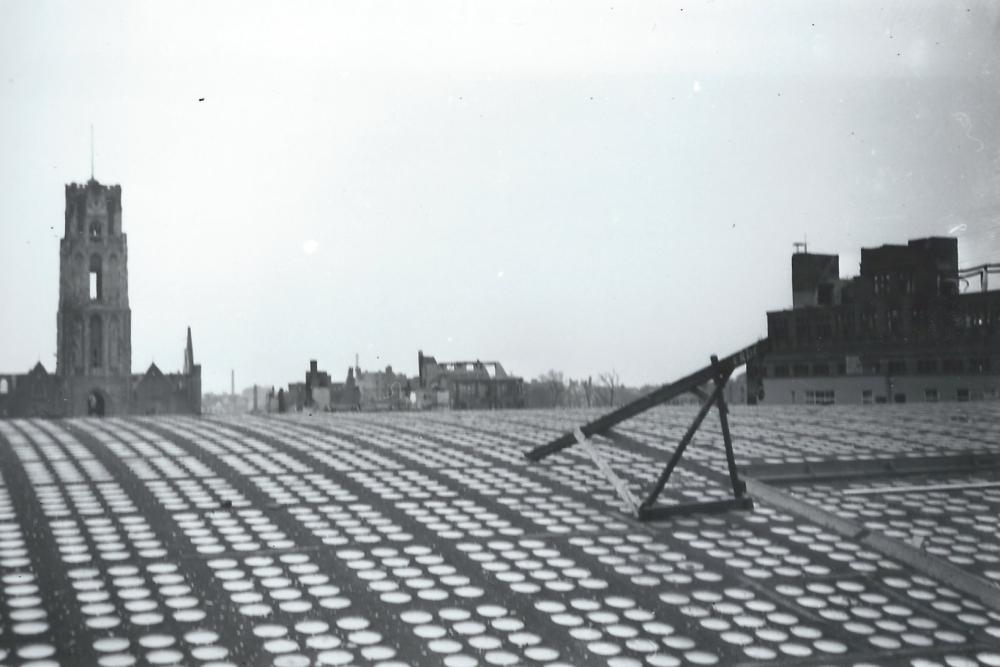
Picture taken on June 1 juni 1940 from the roof of the Beurssl on Coolsingel. Source: Reinier Brentjes
As of yesterday, I have a police permit to reach the inner city by the shortest route; without that paper I would have to make a detour of half an hour. Today, the ANP announces that Belgium as well has succumbed to the violence of the German arms; King Leopold who, contrary to our Queen has remained in his country, has laid down the arms.
In the afternoon, a heavy thunderstorm erupts. This thunder sounds far more sympathetic than the bombs.
Wednesday May 29
Today, someone who has lost everything, has been to the office again. Defeated, he tells me: 'All four trucks are gone sir, tools, everything. I have worked hard for it, all these years, it was proceeding nicely'. We remain silent. What should one say in response to these words that disguise a lot. We know it is true; this man has worked hard to set up a fine business. There are dozens like him.
Thursday May 30
Nothing special
Friday May 31
Another quiet day again.
Definitielijst
- heat
- High-explosive anti-tank warhead. Shaped charge projectile to punch through armour. Used in e.g. bazooka or in the Panzerfaust.
Saturday June 1 to Sunday 30, 19401/30-06
Saturday June 1
In the afternoon I have gone to Vlaardingen to buy a new bike (after all, it has been the last day of the month). The trade was lively, the bikes sold like warm bread. On the way I cycled past the remnants of the Groote Kerk.
It is a shame, how much the nave of the church, the tower as well, have suffered. Similarly, the Schouwburg on Aert van Nesstraat, those have suffered irreparable damage as such buildings will not be rebuilt in the original state.
One good side of the case is that in one fell swoop, all hovels in the inner city have disappeared. I have been in the parc for a while, looking for the wooden crosses. (see May 19). Apparently they have been relocated.
Sunday June 2
In the morning I took a walk; near Overschie I saw a column of Germans on horseback. In the afternoon, I cycled to Zevenhuizen, at least close to it; the weather is nice and that makes one feel good.
Monday June 3
Nothing important.
Tuesday June 4
The night of June 3 to 4 is very uneasy; the nowadays German anti-aircraft artillery fires heavily. We turn over and fall asleep again after a while. During the day, I hear from nine out of ten people they have risen at night and prepared to leave immediately if necessary. They look surprised when they hear we even haven't left our beds. Probably we are a bit careless but to me that seems better than remaining awake night after night. The nightly turmoil can last very long.
Wednesday June 5
As a heavy (250kg) bomb has to be removed from the Beursbuilding where our office is located now, the building is evacuated during the afternoon. I take advantage of the occasion to pay a visit to the cemetery where a few Dutch and German soldiers have fallen.
The crosses for the Dutch are white, those for the Germans brown. There are helmets on top of some crosses, a few with bullet holes in them. Some people lay down flowers. There are many wreaths already, a monument has been erected near the Dutch graves; beds of geraniums are neatly laid out.
It seems strange that the Iron Cross worn by the Germans show the year 1939. Is this a mistake or has this cross been used before?
Even here, on this sacred location, you can hear the thunder of blown walls and exploding bombs from time to time.
The majority of the Dutch soldiers was killed on Waalhaven, the majority of the Germans on or near the Maas bridges. Here, all are united in death. There are also crosses under which nameless soldiers lay buried. Rotterdam has its own 'Unknown Soldier' now.
Thursday June 6
Today there is nothing special to report except for the heavy blasting when walls etc. are being blown up.
Friday June 7
Today, it is 600 years ago that Rotterdam was granted city privileges. During that time, Rotterdam has grown from a fishing village to a metropole which, with over 600,000 inhabitants (written in 1940 Ed.), its harbor installations, old buildings and modern flats, its trading spirit and its cultural life, was great. Was great because many citizens have fled, the majority of the old buildings has been destroyed, it is quiet in the beautiful harbor but the energy to get things done has remained.
Studies for a new center are already under way and attention will be paid to a concert hall and a theater. As from now, many businessmen have opened up new offices with the strong intentions to restore what was lost and although for the time being it means making do with what you have, Rotterdam is working again and will adapt to the changed situation. Tomorrow, our city will enter its seventh century of existence with an unabated work spirit.
Saturday June 8
According to the ANP, the great battle in Vlaanderen in the course of last week, has ended in a massive German victory. Belgium as well is now entirely in German hands while parts of northern France are occupied. On orders by the Führer, church bells must be ringing in Germany a few times day and flags must be flown to celebrate the victory, to honor the soldiers and to commemorate the dead. According to the Germans, the war has now entered a new phase. The airfields of Paris and Dover have been bombed and the harbor facilities in some cities have been destroyed. On the other hand in western Germany, the British seem to fight fiercely. It is hard against hard.
Sunday June 9
Today is a quiet day.. That of course applies to Rotterdam and surroundings as it goes without speaking I can't report about events unfolding outside our borders. When I do report about it from time to time, I gather my information mainly from the ANP. The way I keep this diary shows sufficiently which facts I observed, learned or experienced myself in some other way.
Monday June 10
In the evening, the ANP announces that Italy has declared war on France and England. Mussolini has informed the Italian population accordingly in a speech. He was cheered enthusiastically, according to ANP. Italy enters the war energetically…. Where will this lead to and who will follow!
Today, Norway has capitulated as well; the Allied troops have withdrawn after which the Norwegian high command has entered negotiations with Germany. In northern France, a fierce battle is raging between German and French legions. Today, the first contingents of prisoners-of-war have returned to the Netherlands, about 10,500. They will be housed in the eastern part of the country for the time being before returning to their homesteads.
Tuesday June 11
The president of the USA has made all American sources of material available to the Allies. Furthermore, President Roosevelt has reproached the Italians and said that the sympathy of the American people goes out to the Allies.
Wednesday June 12
Meanwhile, Albania has also declared war on England and France while South-Africa, New Zealand and British India are in a state of war with Italy.
Thursday June 13
According to an army bulletin, German troops are some 12.5 miles from Paris.
Friday June 14
Paris in German hands. This is the most important message for today, Friday June 14. As far as I know, German troops have not entered Paris since 1870. Initially, the messages stated that Paris was to be defended but today, it was declared an open city so the Germans could walk in unimpeded. Paris being one of the most important centers of economic life in France and moreover, as an important part of the French armament industry is located here, this is a severe blow for France.
French troops seem to have occupied positions south of Paris now. Not much is reported about the actions of the Italian armed forces. The Allies however seem to have bombed Italian cities already while Italy itself seems to focus on Malta etc. Many important decisions are expected from Turkish side soon.
Meanwhile in our country, we have received ration cards for clothing and shoes. No permit for buying new shoes will be issued unless it can be ascertained the old ones are entirely worn down and there are no other pairs available. In The Hague, some persons have taken advantage of the darkness to daub the windows of Jewish shop owners.
During the past nights, it is very quiet in Rotterdam, quieter than during the day because walls are still being blown up. People hardly know what to do with the massive mountains of debris. The Schie has already been filled in, the land of Hoboken filled, de Kral, Plasrand littered with stones: the Maas swallows massive amounts while furthermore, large amounts of debris are transported to the north. It will be used for the Zuiderzee works, road construction and such. This morning I heard the difference between the Rotterdam before and after the war: before the war the Schie was in Rotterdam, after the war Rotterdam is in the Schie!
Repair works suffer from a shortage of glass and such. The Rotterdam glass factories have been destroyed and the Netherlands itself have no window glass industry worth speaking of. England has been cut off as supplier, Belgium itself now needs it more than ever so we are forced to turn to Germany; delivery however takes some six weeks. Yes, it shows a city is sooner destroyed than rebuilt.
Saturday June 15
Yesterday, the bank moratory which was imposed over a month ago, has been lifted. The Exchange has not been opened yet though after the session of May 9. According to the Nieuwsblad, the bombing has caused some 100,000 homeless, that is to say, about 1/6th of the population of our city. The former surplus of houses has vanished completely and has turned into an urgent shortage of suitable housing which has to solved one way or another.
Today, over a month since the bombardment, the Blauwhoedenveem on Leuvehaven is still burning. Massive amounts of coffee beans had been stored here which now produces a strong cup of coffee with the water used for extinguishing, it is a pity it flows out on the street, people could use a little cup of solace now! Coffee and tea for normal consumption have been rationed some fourteen days before. The rations have been set at 50 grams of tea or 250 grams of coffee per person per month. We'll have to drink weak coffee and tea now!
Tonight, the newspaper announces that bread will be rationed as of next Monday. A person will receive 2,000 grams of bread per week. Cake and pastries remain freely available.
A Russian-Lithuanian conflict of a few days ago has been solved. Russian troops have occupied the major cities in Lithuania. The government of the country has stepped down immediately. The new one will have to be approved by the Soviets. Some 2,000 tanks have arrived in Lithuania; are the Soviets planning something? Maybe it is a positive development that those tiny states disappear, although for the victims involved it will not be pleasant. But at the moment, more unpleasant things are happening.
Sunday June 16
Estonia and Latvia have now been occupied as well by the Russians, 'in order to ensure the correct enforcement of the relief agreement signed in the fall of 1939', so the ANP writes.
Germany reports having breached the Maginot line in various places. I don't hear any British or French messages, the information is undoubtedly one-sided.
Monday June 17
France has capitulated! Sooner than generally expected, France has succumbed as well. After a new government had been established yesterday or the day before and which was changed just one day later, the German government has been asked today to what extent Germany is willing to accept France's conditions to end hostilities.
Fighting in France has been fierce. Yesterday, Verdun fell, the fortress for which has been fought in vain during the First World War. At the time, 700,000 men were killed. Without a doubt, in France numerous soldiers will have been killed. Various messages report heavy fighting, fierce resistance and the bombing and destruction of fleeing troops! The war is being fought with inhuman cruelty. Did someone once speak about humanization of war? War and humanity, a contradiction that can lead to a compromise on paper at the most. In battle, there is no place for humane feelings.
Tuesday June 18
This night, airplanes have been under fire again. Through the attic window I see the strong beams of the search lights in the night sky. Where the beams meet, an airplane is caught in the light. The projectiles create sparks each time where they explode. It is a fantastic sight. The airplane isn't hit however and a little later, the lights are turned off; leaving the sky as black as it was before. Nothing important during the day.
Wednesday June 19
Italy considers itself at war with Transjordan as well.
Thursday June 20
The workers clearing the debris have obviously not lost their sense of humor as witnessed by the signs placed on the remnants of Tivoli cinema: 'ticket office opens today,' 'start at 20:00', 'military half price'. On the wooden sheds erected in the city, messages appear such as: 'Villa Work Spirit', 'Furnished rooms to let' and such. By the way, the flower stalls on Coolsingel have adapted and have started selling lemonade, cake, buttermilk and such.
Friday June 21
Nothing important to report.
Saturday June 22
Today at 18:50 the armistice between France and Germany has been signed in Compiègne after a few days of negotiations. France has obviously accepted the conditions. Hostilities have not ceased yet however. This will happen six hours after France has signed an agreement with Italy as well. Negotiations about this are under way.
Sunday June 23
In the middle of the day, around 14:00, a British plane flies over Rotterdam. The clouds of the anti-aircraft projectiles pop up around it. The aircraft is not hit though and disappears. This is the first time since the ending of the war here that I see a British plane during the day, as far as I can remember.
Monday June 24
The ANP continuously reports about British bombardments on German and Italian cities. England now strands practically alone against the German and Italian forces; it does have the moral and material support of America.
This night, the ANP reports that somewhere in a jungle, a colony of white people has been discovered who have probably been cut off from 'civilization' for 25 years. They'll be sorry for it.
Tuesday June 25
In the night of June 24 to 25, at 01:35 hostilities between Germany and Italy on the one hand and France on the other have ceased. So, the treaty with Italy has been signed, at 07:15 to be exact. The German government has been informed accordingly twenty minutes later; another six hours later, hostilities have ceased. The battle on the West-European continent is over. Today, France has declared this day as a day of national mourning. The fallen will be commemorated across the entire country.
According to the press, this morning the air raid alarm has sounded in London for the first time since the outbreak of war on September 3, 1939, over nine months afterwards. In our country, war broke out on May 10, the first air raid alarm in Rotterdam was on the same day. At about 19:00 at night, I hear anti-aircraft fire. There must be British planes in the air, it is not clear enough to spot them though. I do see the clouds of gunpowder.
Wednesday June 26
Nothing important.
Thursday June 27
This night, the rumble of natural thunderstorms was interspersed by the thunder of the anti-aircraft batteries. The black thunderclouds are illuminated by search lights looking for airplanes. During the morning I learn that bombs have come down at the Heulbrug and other locations. Almost all windows in the vicinity have been shattered. Apparently, Rotterdam hasn't suffered enough yet. Personally. I can sleep through the noise although I do not get up like many others do, according to what they say. If I wake up, like tonight I roll over and attempt to resume my sleep or I look through the window for a while.
According to the press, Den Helder and Haarlem have been bombed as well, Den Helder rather heavily though.
An unexpected news bulletin says that the Soviet Union has set an ultimatum to Rumania, Russia demands the return of Bessarabia, ceded to Rumania after the First World War (1914 -1918) and the Northern Bukovina. Rumania has requested negotiations with the Soviet Union.
Friday June 28
Today, Russian troops have entered Bessarabia and N. Bukovina. The Rumanian troops have been ordered to retreat in orderly fashion. Apparently, the conflict will be solved to the benefit of the Soviet Union without any bloodshed.
The Dutch newspapers publish details today about a foreign exchange regulation, still to be imposed. Free foreign currency, liberal trade and other classic economic concepts are drastically shoved aside. After the numerous crisis measures of the past decade, which has already severely limited business life, we apparently will now enter the era of the command economy. I don't think this is to be lamented because liberalism has led to such excessive situations, to such disproportionate contrasts that a change can hardly be considered anything else than an improvement. It goes without saying that for many, in particular among the elderly, for whom the abolishment of almost sacred notions will feel like a slap in the face. For those however who have seen this coming as a result of social development, all this will not be very unexpected and therefore more understandable. We live in a very dynamic time and we will do well to attempt to understand these times because only he who understands, will later be able to steer the economy in the right direction. We have to change from commanded economy to a well commanded economy which to me means 'Prosperity for all'.
Saturday June 29
This night, firing has been heavy again. Streams of pink tracer bullets were fired into the air as well. During the day, I learn heavy damage has been inflicted, even numerous people have been killed.
Sunday June 30
Quiet.
Definitielijst
- First World War
- Took place from 1914 till 1918 and is also named The Great War. The conflict started because of increased nationalism, militarism and neo-colonialism in Europe. Two alliances battled one another during the 4-year war, which after a dynamic start, resulted into static trench warfare. The belligerents were the Triple Alliance (consisting of Great-Britain, France, and Russia; later enlarged by Italy and the USA, amongst others) on the one hand and the Central Powers (consisting of Germany, Austria-Hungary, Bulgaria and the Ottoman empire) on the other hand. The war was characterized by the huge number of casualties and the use of many new weapons (flamethrowers, aircraft, poison gas, tanks). The war ended in 1918 when Germany and its allies surrendered unconditionally.
- Führer
- German word for leader. During his reign of power Adolf Hitler was Führer of Nazi Germany.
- Iron Cross
- English translation of the German decoration Eisernes Kreuz.
- Maginot line
- French defence line along the French-German border.
- moral
- The will of the troops/civilians to keep fighting.
- raid
- Fast military raid in enemy territory
- resistance
- Resistance against the enemy. Often also with armed resources.
- Soviet Union
- Soviet Russia, alternative name for the USSR.
Monday July 1 to Wednesday 31 1940
Monday July 1
Like yesterday
Tuesday July 2
Today, the amazing message has been published that the mayor of The Hague, Mr. de Monchy has been removed from office by the German authorities. The reason is unknown to me. In the night of Monday to Tuesday, the railway bridge across the Maas has apparently been bombed by the British. Traffic has been curbed.
Wednesday July 3
General Winkelman, commander of the Dutch armed forces, has been transferred to Germany as a prisoner-of-war for having displeased the Führer of the German Empire. At the same time, an order has been issued that all non-Aryans who have left Germany after January 1, 1939 and are now living in Holland, have to report to the police stations in the various municipalities.
I assume I have not yet reported about many Dutchmen who have gone to Germany in order to be deployed mainly in the technical industry. Thousands have already answered Germany's call for a seemingly unlimited number of workers in the armament industry and agriculture.
In Rotterdam, the Damage Enquiry Committee will start its work on July 5. Forms have been made available on which war damage can be reported which will be registered for the time being.
Thursday July 4
According to the press, the British and French fleets are engaged in battle on the Mediterranean.
Friday July 5
Tomorrow, an almost nationwide collection will be held for the benefit of those who are stricken by the war. It has been postponed twice already in Rotterdam even for the third time. Now probably until July 16, apparently all sorts of problems occur. Today, the fortress of Gibraltar has been bombed for the first time in this war.
Saturday July 6
A ban on publication for the duration of eight months has been imposed on the antirevolutionary newspaper De Standaard. Apparently, the editors have not taken the loyal attitude the Germans had assumed when they permitted publication of the various newspapers without censoring. For some time now, the 'Deutsche Zeitung in den Niederländen' or German paper in the Netherlands is being published.
This afternoon, the German authorities have issued a proclamation that extremely forceful action shall be taken against espionage, anti-German demonstrations and for not giving the mandatory salute to German military and such. In particular espionage for the British seems to be committed on a large scale.
In town, building of emergency housing has begun. A low brick wall is laid on the foundation and the rest is constructed from wood, at least that is the idea. There is however a shortage of building material so in final restoration, the most urgent needs will have to get priority. On paper, plans for a new center are well on their way but at the end of the day, many problems will have to be reckoned with.
Sunday July 7
According to the ANP (last Friday), France has severed diplomatic relations with England because of the fleet incident. Today quiet.
Monday July 8
Another paper has been banned: the weekly De Reformatie.
Next Monday (July 15), trading in money and shares will resume. Finally, after a closure of more than two months. Initially, a very small number of shares will be accepted for trade.
Somewhere in Zoomerhofstraat, a shed for debris cleaners has been renamed Debris Bar, beneath the lettering a beer mug, to the left the text 'Lunchroom' and to the right 'Two billiard tables'. The shed can hardly house two workers. Furthermore there are sheds named 'The sweat team', 'Always remain calm' and numerous other funny or serious names.
As it has been raining heavily today, the rumor immediately pops up: the British must have dropped tear gas bombs. Humor still exists.
Tuesday July 9
Nothing important.
Wednesday July 10
Like on every Wednesday, many soon to-be-wed couples are standing in front of the town hall. Most of them arrive on foot as cars will only be made available for the most urgent cases due to the shortage of fuel. Marriages are considered (of course!) not necessary. So they arrive on foot, in a carriage, by bicycle. Today I see them arrive in a decorated tram; the paper publishes a picture of a couple arriving by stepper. That is either original or the war has clouded the senses, just the way you want to look at it.
Thursday July 11
Nothing to report.
Friday July 12
In the night of Thursday to Friday, bombs rain down in Rotterdam again, claiming a few victims. Other cities are being bombed as well.
Saturday July 13
The collection that was to be held here (see July 5) has been postponed again, until July 23 this time. I assume the trouble is that the collectors have been burned together with the collecting boxes!
Sunday July 14
Nothing important.
Monday July 15
The exchange has been reopened today, albeit with official trade in only a few state funds. The trust in these funds seemed steady. Furthermore, unofficial trading takes place in other shares; their quotation must still be settled and then they will gradually be accepted for official trading.
Tuesday July 16
The board of the NVV (Dutch Trade Union) has been ousted; the motivation being that in its present form, close cooperation with the German authorities couldn't be guaranteed, it focused too much on class struggle. Management has been handed over to Mr. Woudenberg, member of the NSB. (Dutch branch of the Nazi Party).
Wednesday July 17
As of last Monday, margarine, butter and fat have been rationed at 250 grams per week per capita. According to statistics, the Dutch consumes 310 grams per week on average so we have to make do with 30% less.
Thursday July 18
Nothing important.
Friday July 19
In the evening, Adolf Hitler has delivered a speech on radio; the main point being that he calls on the common sense of the British, not to have the disagreement end in a murderous battle. Hitler considers it possible though that the dispute can be settled. The entire world anxiously awaits Britain's response; the general attitude prevails that Britain will fight to the utmost. If that turns out to be true, a massive German attack on the British isles seems possible in the next week. Maybe, England will launch an attack on Germany in turn.
Saturday July 20
Mr. M.M. Rost van Tonningen, one of the most prominent figures of the NSB, has been put in charge of the SDAP, RDAP and the CPN (Dutch political parties)
Sunday July 21
This night, British aircraft have been in the vicinity again, last night as well though. When I leave town, a black cloud of smoke rises over the horizon. I assume in the direction of Pernis. Maybe one of the oil storage tanks has been hit there.
In the morning around 11:00 an airplane leaves white smoke trails high in the sky, the intention isn't known to me.
Monday July 22
The 'Arbeiderspers' has been put under new– Nat. Soc. – management. The former director, Mr. van Veen has passed away unexpectedly.
Tuesday July 23
The collection of the National Hulp Committee has been held in Rotterdam today. A high revenue is expected.
Wednesday July 24
Last Monday night, the British minister Halifax has turned down Hitler's appeal on John Bull's common sense in a speech; that means war to the utmost.
The Baltic states Estonia, Latvia and Lithuania have requested to join the U.S.S.R. as independent federal states. The Supreme Soviet will probably decide on this on August 1.
When I left classes last Monday, there were riots in the Crooswijk suburb. NSB men exercising on Schuttersveld have allegedly been molested by inhabitants. There was heavy firing with pistols, I couldn't establish by whom.
On Goudsesingel, Coolsingel and elsewhere, emergency shops are being built diligently. People are active in other ways as well: committees are set up, pamphlets appear, speeches are held and there is talk about reconstruction. Meanwhile houses are being destroyed by bombs almost daily or rather nightly base, claiming victims of course.
Thursday July 25
Nothing important to report. Tuesday's collection has yielded some Hfl 109.000.
Friday July 26
In the night, there was shooting again in the sky over Rotterdam. As I more or less slept through it, this time it was closer than usual. A splinter of a few inches has penetrated the attic window.
During the day airplanes over Rotterdam have been shot at again.
When we decided to go swimming in the pool at Oude Plantage last Friday, an article appeared in the papers that it had been closed due to damage, so we didn't go. On hearing that it will be open again tonight, we went there and discovered that the damage is war damage as well. The entrance and the shower cabins have been heavily damaged; this happened during the night of Wednesday 17 to Thursday 18.
Saturday July 27
Nothing important.
Sunday July 28
Like yesterday.
Monday July 29
Like yesterday.
Tuesday July 30
The construction of emergency shops on Coolsingel progresses quickly. On low foundations made of concrete, brick walls are being erected. They use the undamaged bricks from the piles of debris. So the material is close at hand.
Wednesday July 31
Nothing to report.
Definitielijst
- Führer
- German word for leader. During his reign of power Adolf Hitler was Führer of Nazi Germany.
- Nazi
- Abbreviation of a national socialist.
- NSB
- National Socialist Movement. Dutch political party sympathising with the Nazis.
Thursday August 1 to Saturday 17 1940
The past nights have been unusually quiet. During the day, columns of singing German soldiers pass by.
Friday August 2
Nothing to report.
Saturday August 3
Next Monday, the distribution of textile ration cards will begin, a measure that has taken quite a lot of work and which is fairly complicated because of the wide variety of textile goods.
Sunday August 4
Quiet.
Monday August 5
Although any pro-Orange demonstration is prohibited – even wearing ribbons etc. – today one can notice something was happening. It is the birthday of Princess Irene and street musicians play national songs while pupils sing: 'Long shall she live' etc.
Tuesday August 6
Quiet.
Wednesday August 7
In the evening it is restless in the suburb of Crooswijk. It has gradually become a sort of habit. Unruly youngsters seem to incite to violence. During the past days, I hear little important news about the war.
In the Netherlands, the Germans have confiscated many Rhine barges, tugs and such. What they are planning to do with them will probably become clear later on.
Thursday August 8
Quiet.
Friday August 9
The last days a rumor circulates that Holland has such a strange climate. In the evening at 19:00, there is a strong draught causing everybody to close their windows. That lasts about fifteen minutes. Every evening at 19:00, England transmits news messages in Dutch; listening to it is forbidden and leads to severe penalties. Hence those weird climatic conditions!
Saturday August 10
In the night, there was heavy fire on aircraft again and this morning at 08:30 as well. It must not be quiet for a long time, otherwise we'll be spoiled.
Sunday August 11
In Rotterdam Zuid, riots have taken place, the inhabitants of a certain location are now forbidden to leave their homes after 21:30, doors and windows must remain closed and trespassers will be shot on sight.
Monday August 12
The newspapers report about a massive air battle over the Channell between German and British aircraft.
Tuesday August 13
Amsterdam has received its share of bombs as well; quite a few houses have been destroyed.
Wednesday August 14
The wreck of ss Statendam has been sold to the demolisher. After a relatively short but glorious existence, it has become a victim of the war in May.
Thursday August 15
Nothing important.
Friday August 16
According to the news bulletins, the past days fierce air battles are going on over England. Numerous harbor facilities, airfields, storages and such are being bombed.
Saturday August 17
In order to compensate for the steadily rising expenditures of the government, postal rates will be raised as of August 20 next. Telephone rates will increase by 50% as well.
This morning, an aircraft has landed in Noord Brabant; after having set the plane on fire, the occupants - about twelve – have vanished without a trace. In an extra police message, a reward of Hfl 500.- is offered for tracking down the crew. The military commander in the Netherlands, General F. Christiansen, has voiced warnings and threats in a proclamation to those who will help and support the British in any way.
As I get extremely tired writing down news about the war every day and because my vacation begins today so I can really get away from everything and forget all misery in nature, I consider this a good opportunity to close these dark pages that have shown a small part of reality. May a quick peace put an end to this inhuman struggle which has abruptly ended the young lives of so many.
But may a new order be established at the same time, based on righteousness; an order that guarantees a humane existence to all. The technical possibility exists to provide prosperity to all people but man should think of this: that people are not prosperous as long as not every citizen does not share that prosperity. Technology should serve the community, not individuals. When a nation produces, inhabitants of that nation share the revenue. Let's draw a sponge across the past when the 'everybody to himself' prevailed and let's look forward to the time that comes when the attitude will be 'all for all'.
I am going on holiday now.
Information
- Translated by:
- Arnold Palthe
- Published on:
- 16-07-2025
- Last edit on:
- 17-07-2025
- Feedback?
- Send it!
Sources
Thanks to Arne Brentjes for his permission to publish his father's diary on our website. We were permitted to the pictures of his father as well. The negatives of these pictures are preserved in the Stadsarchief Rotterdam (Municipal Archive) We also thank Myriam van Apeldoorn, Nelleke Postma, Wilma Scheltema, Patrick Schellen and Marjolein Jupijn for their help with the digitalization of the handwritten text.
